Inspiring ideas for the studio


SHINE ON
Inspiring Diverse Repertoire





JULY 7–9, 2023









JULY 7–9, 2023

After the success of Light the Spark: Inspiring Diverse Repertoire for our 2021 summer workshop, we’re delighted to explore MORE wonderfully diverse rep for our 2023 summer workshop in sunny San Diego! Join us for sessions on wide-ranging topics such as Nordic diction and art song, hidden gems of musical theatre, Korean art song, hip-hop and commercial music, American Negro Spirituals, Catalan vocal repertoire and more! Don’t miss this incredible opportunity to broaden your musical horizons across all genres.
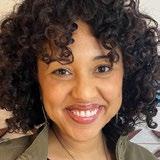
Plus, we’ll award more than $44,000 to singers in the final rounds of our National Student Auditions.
Early-bird deadline: May 1, 2023
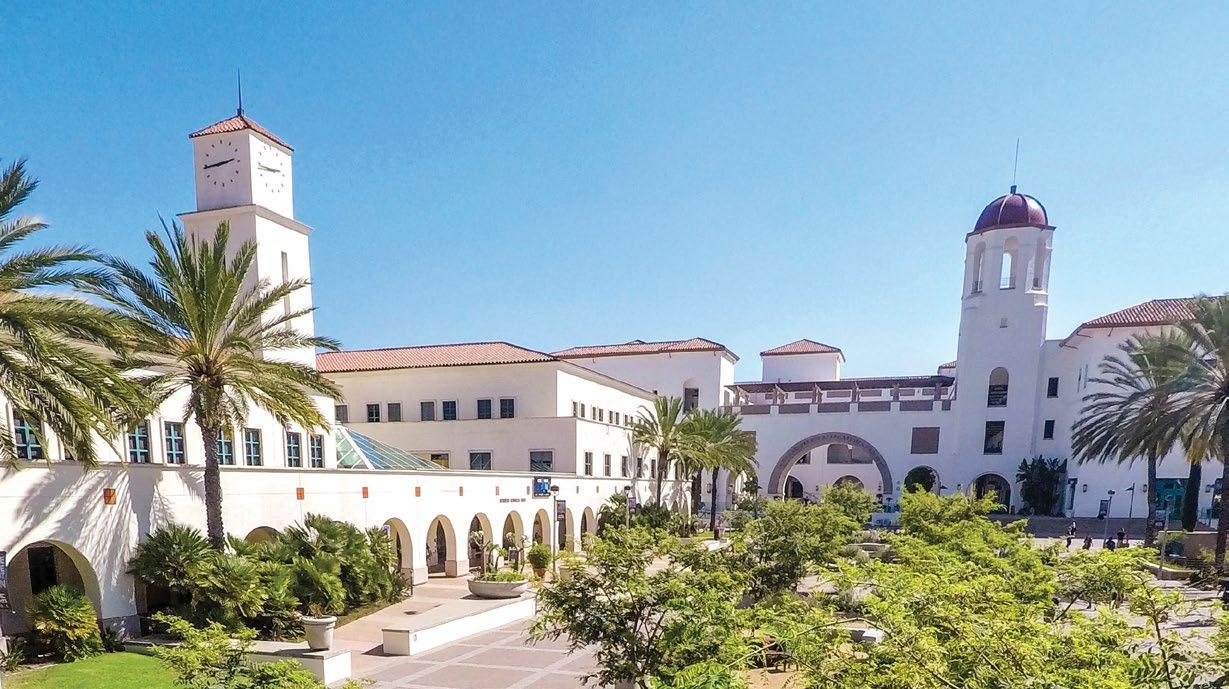
$249 NATS member rate ($279 after May 1) Hotel block available. See website for details.

JULY
SAN DIEGO STATE UNIVERSITY Keely Phillips-Carter Alexis Davis-Hazell Colin Levin San-ky Kim Rosalyn Wright Floyd Melissa Foster Isaí Jess Muñoz FEATURING: SAN DIEGO STATE UNIVERSITY11 NATS names Rene Orth first place winner of 2023 Art Song Composition Award
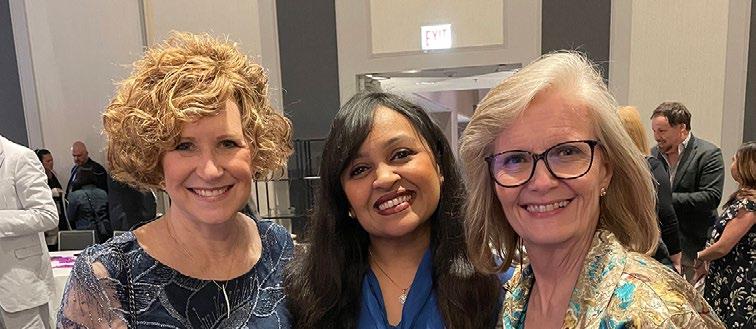
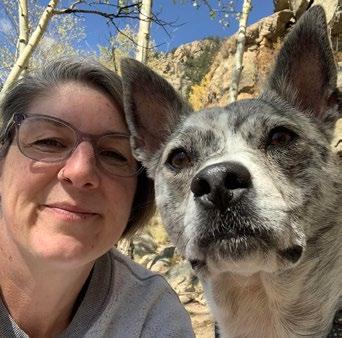
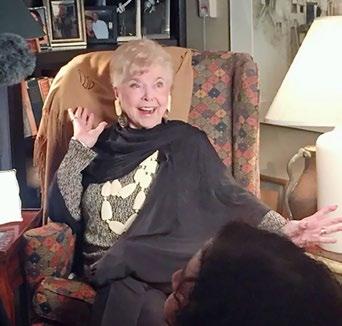

With the holidays already far in the rear-view mirror, down in south Georgia we are in the midst of an early February warm spell where it heats up just enough to fool us and some of the redbud trees and tulip magnolias begin to blossom. We even have the faint beginnings of the dreaded yellow haze of pollen. Likely, it will freeze again, those blossoms will wilt suddenly, and the haze will disappear for a few more weeks until a more permanent warm spell emerges in March (sorry, northern friends). I was thinking about how some of these plants are like our students and how part of our challenge is tending to our studios full of a wide variety of “blooms” all on their own schedule of growth and development.
Our spring audition season culminates with the preliminary online rounds and semifinals of the NATS National Student Auditions. It was so energizing to see all of the excitement online during our fall audition season as most returned to live, in-person events. It has been an adjustment for leaders to return to planning these live events and for us to again juggle travel arrangements, registration, and adjudication assignments, but what a reward to see and hear some outstanding singing and gather together again. All the finalists of the 2023 NSA will converge on San Diego and our host campus San Diego State University for the final round in conjunction with our NATS Summer Workshop. Make plans to join us now July 7-9th and check out the details elsewhere in this issue and on our website.
Our commitment to expanding the canon of repertoire continues at this year’s Summer Workshop, so read about all the details and the great lineup of presenters. Additionally, we will soon have more resources on our site curated by our team who brought you our “Expanding the Canon” premium workshop at our Chicago conference.
If you are looking for a longer professional development opportunity this summer, then I urge you to consider our inaugural NATS Science-Informed Voice Pedagogy Institute in Logan, Utah, June 25 – July 1. Lynn Helding and John Nix will
VOL. 56, NO. 1
PUBLISHER
Allen Henderson, Executive Director, allen@nats.org
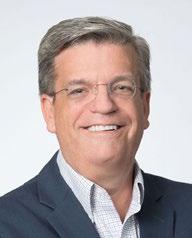
EDITOR
be joined by Amelia Rollings Bigler as clinicians. This team is committed to assisting all attendees in improving their studio teaching in all settings and/or teaching of the voice pedagogy sequence. Opportunities abound for feedback, conversation, and deeper understanding of the pillars of our work as voice teachers. I hope you will consider joining us.
If you can’t fit in a face-to-face experience this summer, I encourage you to visit the NATS Live Learning Center and explore the very affordable options for professional development available to you where you can customize your own experience. Better yet, grab a few friends in the same situation, choose some videos, and create a discussion group to deepen the experience.
Allen Henderson NATS Executive DirectorNATS recently announced a major expansion of the National Student Auditions, nearly doubling the number of categories. This important initiative makes the audition experience available to a wider percentage of our membership and their students, namely children, pre-teens, and those passionate about genres outside the classical and musical theatre canon. Several committees are working to have all the resources you need to be successful in adjudicating these categories as well as preparing students for a quality NATS adjudication experience. We are thrilled to finally be able to expand auditions in these important directions and are grateful to all our leaders who are working to successfully implement these offerings. I hope you will share the news with your colleagues who are not yet NATS members and teach in these expanded areas. Encourage them to get involved in your chapter or region and bring their expertise to these events.
I hope the garden of voices you tend blooms spectacularly this spring. I always welcome your communications at allen@nats.org
INDEPENDENT TEACHER ASSOCIATE EDITOR
Cynthia Vaughn, cynthiavaughn@icloud.com
BethBuchanan,
Marketing and Communications Manager beth@nats.orgADVERTISING TEAM advertising@nats.org
DESIGN Carter Publishing Studio inter nos is the official newsletter of the National Association of Teachers of Singing. It is published two times per year (spring and fall) for all NATS members.
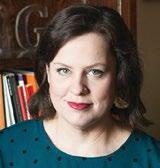
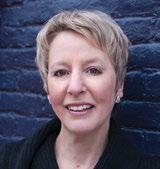
JUNE 25 – JULY 1, 2023
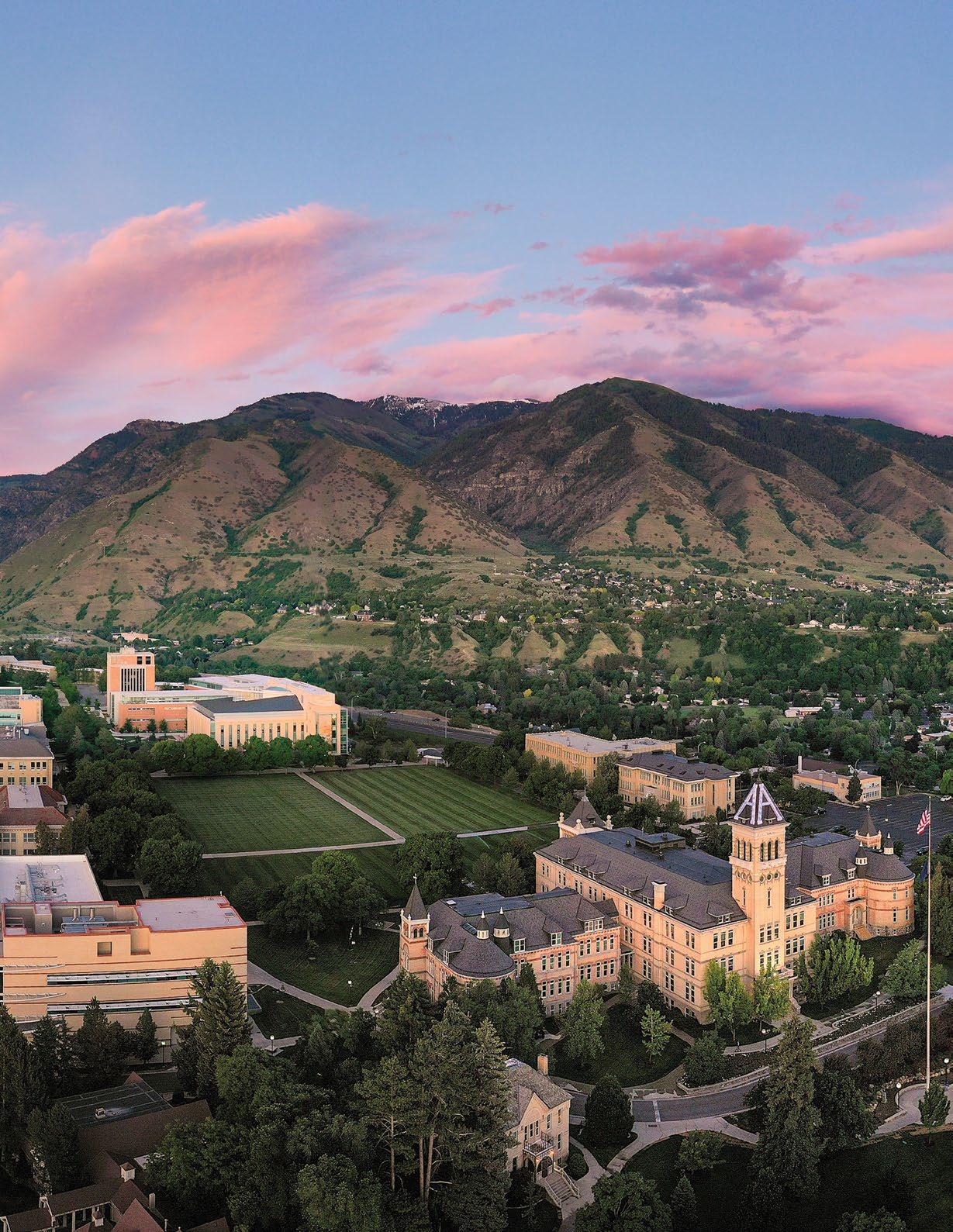
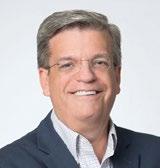
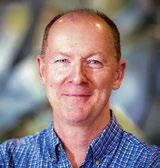
◾ UNDERSTAND the pillars of voice science: physiology, vocal tract acoustics, and cognition.
◾ LEARN how to apply science-informed voice pedagogy resources in your teaching
◾ REFRESH your pedagogy course content
◾ ALIGN your courses with the NATS science-informed pedagogy resources
◾ RECEIVE mentoring in classroom pedagogy teaching
◾ NETWORK with other teachers in the field
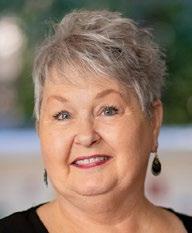
Recently, I’ve been fascinated by the concept of temporary art, inspired by street chalk artist David Zinn. Zinn has an incredible eye and imagination and he creates detailed whimsical animals on urban sidewalks, parking lots, playgrounds, brick walls — whatever strikes his fancy! Zinn photographs his urban art and posts videos of the making of the art, but few passersby see the actual art. Each detailed powdery chalk drawing will eventually wash away with rain or snow or be covered by leaves and muddy shoes. Not only is Zinn’s chalk art temporary, but he happily encourages copycats like the children who drew their own chalk art next to his on a playground. Zinn describes himself as a “habitual doodler and street artist, wrangling ephemerality and finding uplift underfoot.”
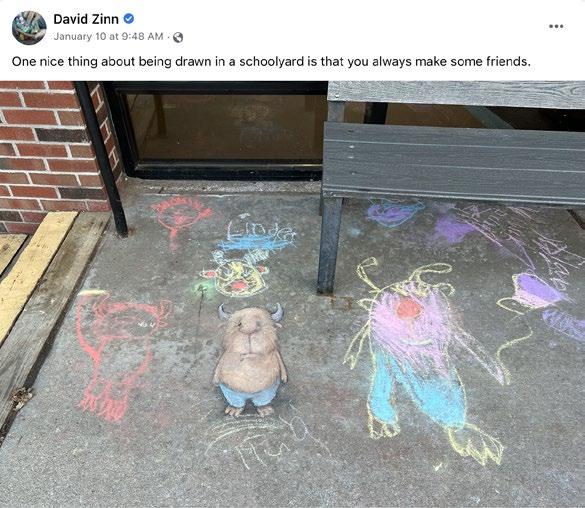
When I was packing for a cross-country move last summer, I found a lot of faded performance programs and photos of me in concert gowns and peasant skirts, but virtually no recital or stage show audio recordings or videos. I was a little sad
not to have those souvenirs, but also strangely grateful. I had proof on paper that the performances happened and that jogged pleasant memories. However, in the predigital era I did not have the pressure of having to perform perfectly for posterity. (There’s a tongue twister!) My colleagues and I performed in the moment, and if you weren’t in the theater or concert hall you missed it. It was gone. You couldn’t stream it or download it to watch later.
Cynthia Vaughn Associate Editor for Inter Nos CynthiaVaughn@icloud.com
Even the performances I did save are not easily accessible or shareable. They are on outdated technology. Somewhere in a storage box, I’ve got dozens of voice lessons recorded on cassette tapes and a VHS video tape of a graduate recital that my husband accidently recorded over with a Super Bowl. (But that’s another story.) Live performances have always been temporary. Recordings of live performances are also temporary because the format evolves for better or worse. (I really miss cassette tapes and my minidisc player.) Just in my lifetime, vinyl was replaced by cassettes, VHS, CDs, DVDs, mp3s … and now vinyl returns. Not long in the future, YouTube and TikTok will also be mere pop culture footnotes.
While old masterwork paintings are curated and preserved in museums, most people will never see the original. Music by classical masters lives on in printed scores and is still performed to the best of our knowledge, though no one who saw the original performances centuries ago is alive to talk about it or tell us how it really sounded. Sometimes all that is left is an aria of a forgotten opera or the title of a work that is no longer extant.
So, why do we bother to make art if it’s temporary and temporal — enduring only for a time? I suggest that is the very reason that we make art. It must be renewed and recreated. We sing the best performance we can in that moment. We teach the best lesson on that day. Then we continue to evolve and create and discover. Sometimes I wonder how well would our students sing if they weren’t being
“So, why do we bother to make art if it’s temporary and temporal — enduring only for a time? I suggest that is the very reason that we make art. It must be renewed and recreated.”
graded or auditioned or adjudicated? How well would we teach if we didn’t have the pressure of performance reviews and legacy — real or perceived? If we are lucky, we will find times in our singing and teaching to create intentionally temporary art. Then we may inspire our students to make art alongside our art, like the children who joyfully chalked their own images next to Zinn’s playground art. May we also learn to “wrangle ephemerality and find uplift” in the studio and on the stage.
In this issue of Independent Voices, I share a conversation with Anna Diemer and Deborah Conquest on the joys and convenience of teaching older adult singers online. Nikki Loney challenges independent studio owners to embrace 45-minute lessons and Christin Coffee Rondeau sings the praises of semiprivate small group voice classes. Jazz singer Sarah Groh goes to the dogs, with her side-business as a house sitter. And finally, a new interview feature “Speaking Independently” invites NATS
leaders and members to explore the future of NATS, beginning with President Diana Allan.
— Cynthia VaughnCynthia Vaughn, associate editor for Independent Voices, has been a proud NATS member since 1983. She has been active in leadership at the chapter and region levels, and she was an invited master teacher for the 2020 NATS Intern Program (postponed to 2021 due to COVID). Before moving to Norfolk Virginia, Vaughn retired from Magnolia Music Studio, the multi-teacher studio she founded and directed in Colorado and Washington from 2008 to 2022. Previously she was on the voice faculty of Colorado State University. Vaughn and the late Meribeth Dayme, PhD, co-authored three editions of “The Singing Book,” a leading college voice class textbook/anthology. Rowman & Littlefield will publish a new fourth edition in spring 2023. Vaughn and Matthew Hoch edited and compiled “The Essentials of CoreSinging: A Joyful Approach to Singing and Voice Pedagogy by Meribeth Dayme,” April 2022.
Members: Now is a good time to update your information on NATS.org. Keeping your contact information up-to-date ensures that you won’t miss any of our member benefits or upcoming events.

To make updates, log on to your Member Home Page (your email address for NATS correspondence is your Login). Then, click the “My Profile” link on the right.
You also can call the NATS National Office at 904-992-9101 for assistance.

The National Association of Teachers of Singing (NATS) has selected 16 members to take part in its 2023 Intern Program

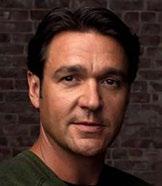
This immersive program pairs expert and recognized veteran teachers with early-career voice teachers and collaborative pianists. Held over the course of 10 days, the intensive format fosters a dynamic exchange of ideas and techniques. Participants walk away from the training with substantially improved studio teaching skills for voice interns and coaching skills for the collaborative piano interns.
The 12 voice teachers (both independent and academic) and four collaborative pianists who make up the 2023 class represent nine of the NATS regions — Cal-Western, Eastern, Great Lakes, Mid-South, New England, North Central, Southeastern, Southern, and Texoma.
The 2023 master teachers Cindy Dewey (Utah State University), Lorna MacDonald (University of Toronto), Trineice RobinsonMartin (Soul Ingredients Voice Studio), and Nathan Gunn (University of Illinois) will work with the voice teachers. The collaborative pianist interns will work with pianist Julie Gunn (University of Illinois).
Carole Blankenship, director of the 2023 NATS Intern Program and immediate past president of NATS, said she is looking forward to working with this outstanding class of interns.
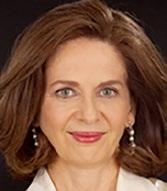
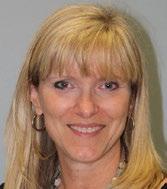
“We are so thrilled to invite this remarkable group of early career voice teachers and collaborative artists to attend the 2023 NATS Intern Program,” Blakenship says. “The group includes active performers and scholars who are teaching in
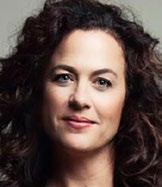
independent studios, college programs, and/or high school programs. They are already contributing to the voice profession in many different ways through their teaching and research, including serving NATS in various ways. We look forward to bringing this cohort of teacher/scholars into the 32-year legacy that is the NATS Intern Program.”
The interns and master teachers will convene from May 30–June 9 on the campus of West Chester University in West Chester, Pennsylvania. Stephen Ng of West Chester University is serving as the local, on-site coordinator, and Tana Field of Murray State University is the vocal literature liaison.
Over the years, NATS interns have maintained close professional bonds. At the biennial NATS national conference, it is a common occurrence for past intern groups to gather for a reunion and catch up with one another. Since its inception in 1991, the NATS Intern Program alumni network has grown to more than 300 voice-teaching professionals.
The program is offered at no cost to interns through generous support from NATS, and donations from the William
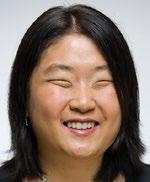
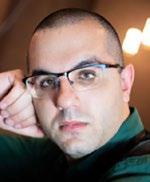

“Bill” Vessels Endowment, the James McKinney Fund, the Barbara Doscher Fund, the NATS Intern Program Grants: Established by the 2021 Master Teachers, as well as the NATS Foundation Heritage Fund.


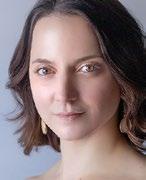
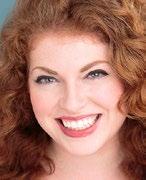

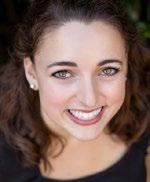
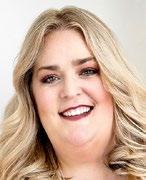


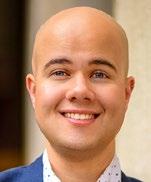

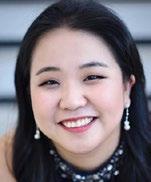

If you are interested in making a gift to support the NATS Intern Program, please visit the online donor portal, scroll down to make a designated gift, and select “Funding for NATS Intern Program.”
You also may contact Bob Bryan at the NATS office at 904992-9101. If your school or facility would be interested in coordinating/hosting a future NATS Intern Program, please contact the NATS past president for details and facility requirements.
The NATS Intern Program is an exceptional training experience. NATS structured the program environment to improve the teaching skills of the interns and promote the interdependent relationships necessary to provide the best instruction for students, who are often taught independently by collaborative pianists and voice teachers. This format encourages a dynamic exchange of ideas and techniques, with the goal to improve the studio teaching skills of voice interns and the coaching skills of collaborative piano interns. Learn more by watching the NATS Intern Program playlist on YouTube
The NATS Intern Program is held annually. Application materials for the 2024 program will be available in late summer 2023.
THANK YOU TO ALL OF OUR SPONSORS FOR THE 52nd NATS NATIONAL CONFERENCE
January 7, 2024
GOLD LEVEL GRAND SPONSOR:
(as part of the NATS Winter Workshop)
SILVER LEVEL GRAND SPONSOR FOR THE OPENING NIGHT RECEPTION

SILVER LEVEL GRAND SPONSOR FOR THE REGISTRATION BAGS & BADGES
OVER $13,000 IN CASH AND PRIZES:
• $5,000 Cash
• A New York solo debut sponsored by DCINY

$50,000 OVER IN CASH ANDPRIZES!OTHER
FIRST PRIZE
• A $4,000 scholarship to attend the American Institute of Musical Studies (AIMS) in Graz, Austria

• $1,000 Gift Certificate from Hal Leonard Corporation

AND CONFERENCE APP CO-SPONSOR AND CONFERENCE APP CO-SPONSOR
OUR OPENING RECEPTION CO-SPONSORS: NATS Great Lakes Region, NATS Mid-South Region, and NATS Southeastern Region
OUR SILVER LEVEL GRAND SPONSOR FOR CONFERENCE FLLASH DRIVES: NATS Cal-Western Region
• Solo recital at the 58th NATS National Conference (June 28 – July 2, 2024)
OVER $6,000 IN CASH AND PRIZES:
• $4,000 Cash
OUR CONFERENCE NOTEBOOK SPONSOR: NATS Eastern Region

• $2,000 Scholarship to attend AIMS in Graz, Austria
• $500 Gift Certificate from Hal Leonard Corporation
• Age 21–35 on September 11, 2023
OUR SILVER LEVEL GALA BANQUET WINE SPONSOR: NATS Mid-Atlantic Region
• Must be a member of NATS (Full or Associate, in good standing) OR coached for at least one year by a current NATS member (Full or Associate)
OUR REFRESHMENT BREAK SPONSORS: NATS Intermountain Region * NATS New England Region * NATS North Central Region * NATS Northwestern Region * NATS Texoma Region * American Academy of Teachers of Singing NATS Wisconsin Chapter * NATS Central Florida and Tampa Bay Chapters
Generous monetary awards sponsored by the Foundation Heritage Fund of the NATS Endowment. Scholarships to AIMS in Graz, Austria are awarded to remaining semifinalists.
The 2023 winning composition is “Weave Me a Name.”
The National Association of Teachers of Singing (NATS) is pleased to announce Rene Orth has won first prize in the 2023 NATS Art Song Composition Award for her work, “Weave Me a Name.”
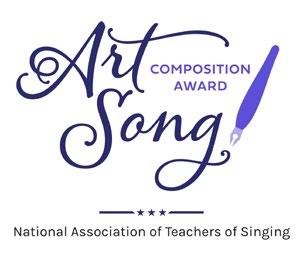
As first prize winner, Orth receives $2,000 and her work will be performed at the 58th NATS National Conference, June 28 - July 2, 2024, in Knoxville, Tennessee. The Cincinnati Song Initiative also will program the work on a future concert.
Orth’s work is a set of seven songs for soprano and piano featuring the poetry of Jeanne Minahan. Composed in 2022, NATS member Emily Albrink (soprano) and Kathleen Kelly (piano) will give the song cycle its world premiere on March 17, 2023, in Roxy Grove Hall at Baylor University. They also will perform the work on March 21 at Notre Dame University and on March 24 at the University of Louisville. The song cycle will appear on Albrink’s upcoming debut album, “Force of Nature,” which is set for release on April 28, 2023, with Lexicon Classics.
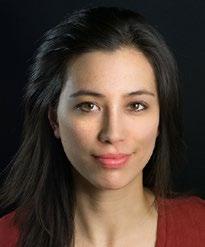
“Weave Me a Name”
1. Beginnings
2. One of Nine Children, Your (Wild) Grandmother
3. The Return
4. The Plaits
5. Your Turn
6. The Single Mother
7. Handiwork
“Winning this distinctive award is an honor, especially as this song cycle was written in honor of Nancy Albrink, a passionate collaborative pianist, pedagogue, and mother,” Orth said. “It’s a beautiful tribute to her. I am also very pleased that the cycle has received this recognition, as I truly believe that more song cycles about the modern female experience — beyond Frauenliebe — need to enter the repertoire and be available for female singers.”
Orth also expressed appreciation for the support of NATS member Emily Albrink.
“A big, big thank you to the incredible Emily Albrink for not only commissioning the song cycle but taking the initiative, drive, and grace to fundraise, record, and produce the album, ‘A Force of Nature,’ that includes ‘Weave Me A Name’ and three additional newly commissioned song cycles,” Orth added. “Her performance, along with pianist, Kathleen Kelly, is just breathtaking, and I can’t wait for the world to hear it. I am also so grateful for the collaboration with poet Jeanne Minahan. Her words have always inspired me, and I was just delighted to have the opportunity to work with her.”
NATS awarded second prize and $1,000 to Raphael Fusco for his work, “Quarantine Camp,” which is a set of six songs for mezzo-soprano (or baritone) featuring the poems of Ryan Vine.
Every year NATS is committed to keeping the composers and their submissions anonymous in the adjudication process as to evaluate only the music itself. Benjamin Krause, Jan McDaniel, and Melissa Wimbish served as preliminary adjudicators. These three chose 11 finalists out 49 submissions. Noted composers Lori Laitman and Tom Cipullo served as the final adjudicators.
“The quality of finalists for this year’s NATS Art Song Composition Award was of the highest caliber,” Laitman said. “All the cycles revealed the composers’ great imaginations and respect for the text, making our adjudicating jobs very pleasant.”
NATS established its Art Song Composition Award in 1983 to encourage the creation of quality vocal literature through the cooperation of singer and composer. Recent winners have included Ericsson Hatfield (2022), Jeffrey Ryan (2021), Kurt
(continued next page)
Erickson (2020), Philip Lasser (2019), Benjamin C.S. Boyle (2018), Matt Boehler (2017), David Conte (2016), Robert Patterson (2014), Melissa Dunphy (2012), and David Sisco (2010). Both the 2022 and 2021 winners, Hatfield and Ryan, respectively, attended the 57th NATS national conference in Chicago on July 4, 2023, to hear their works performed in front of a live audience.
American composer Lori Laitman generously sponsors the cash prizes ($2,000 first prize and a $1,000 second prize) and provides winners a two-year paid NATS membership. The competition is open to any composer, professional or student, whose submitted work meets the prescribed requirements.
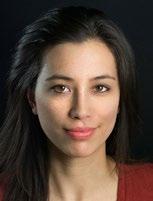
Applications will be accepted beginning June 1, 2023, for the 2024 Art Song Composition Award with a submission deadline of December 1, 2023. The NATS Art Song Composition Award program is led by Carol Mikkelsen, coordinator, and Lori Laitman, advisor.
Rene Orth is a composer who “breaks new ground” (Opera News), writing music described as “always dramatic, reflective, rarely predictable, and often electronic” (Musical America). She begins her tenure as the inaugural resident composer at Opera San José in the 2022–23 season and recently completed her three-year position as composer-in-residence at Opera Philadelphia.
In Orth’s 2022–23 season, soprano Lauren Pearl will tour You Shattered My Deafness (voice and string quartet) with Marlboro Music, mezzo-soprano Sasha Cooke will sing Orth’s Dear Colleagues at Kaufman Music Center, and Jabberwocky (2020) and TakTakShoo (2021) will be screened at the Philadelphia Film Center as part of Opera Philadelphia’s Festival O22 and on the Opera Philadelphia Channel.
Orth’s music often blends electronic soundscapes and beats with acoustic music to challenge the conventions of classical music. In an interview with WQXR’s “I CARE IF YOU LISTEN,” Orth describes pushing the boundaries of instrumentation and technology to explore new harmonic languages to connect with audiences in new and innovative ways.
2023 NATS Art Song Composition
Winners and Finalists:
First Place Winner: “Weave Me A Name” by Rene Orth
Second Place Winner: “Quarantine Camp” by Raphael Fusco
Honorable Mention: “This Be Her Verse” by Kathleen Tagg
Additional Finalists:
Stuart Beatch
David Thomas
Eric Schorr
Sarah Hutchings
Shawn Chang
Louis Josephson
Michael Ippolito
Dylan Tran
Future performances include the premiere of the new song cycle Weave Me a Name in 2023, which will appear on soprano Emily Albrink’s debut album; a new co-commission by Opera Philadelphia and Tapestry Opera, which will premiere at Opera Philadelphia’s O23; and the digital premiere of Reality Winner in Summer 2023 with Opera San José.
Her work has been performed by Berkeley Symphony, Louisville Orchestra, New World Symphony, Festival d’Aix en Provence, Fort Worth Opera, Washington National Opera, Curtis Opera Theater, and others. She has collaborated with Pulitzer Prize-winning librettist Mark Campbel, Dover and Aizuri Quartets, countertenor Anthony Roth Costanzo, baritone Will Liverman, and Pennsylvania Ballet.
Honors and distinctions include an OPERA America Commissioning Grant and Discovery Grant for Female Composers, American Composers Forum Subito Grant, and Kentucky Foundation for Women Artist Enrichment Grant. She has been in residence at Festival d’Aix en Provence, Avaloch Farm Institute, Luzerne Music Center, and others.
Orth holds degrees from Curtis Institute of Music (DMA), University of Louisville (MM), MediaTech Institute, and Rhodes College.
For more information, please visit reneorth.com.
Italian-American composer Raphael Fusco has been hailed by the international press as “one of the most outstanding composers of his generation (El Mundo)” and “accomplished and winning (The New York Times).”
Leading artists perform his genrecrossing compositions for voice, chamber ensembles, orchestra, and theater across the world in prestigious venues such as Carnegie Hall, Kimmel Center Philadelphia, St. Bavo Kerk Haarlem, Casa Milà and the Église de Saint Séverin in Paris. He has written commissioned works for artists and ensembles such as GRAMMY® Award-winning saxophonist Branford Marsalis, Barbara Dever, Chamber Orchestra of Philadelphia, Cecilia Chorus of New York and members of the New York Philharmonic and Metropolitan Opera Orchestras. In 2019, Fusco released his debut album REMIXED featuring original compositions for solo piano praised for their “stunning sonic ideas (Jazz Corner).” In July 2021, he conducted the premiere of his operas inSOMNIA at the Opernfestival Oberpfalz in Amberg, Germany, (“a multifaceted, atmospheric
sound-painting” Mittelbayerische Zeitung) as well as Der Telefonist at the Forum Neue Kunst in Oldenburg in October of the same year. In 2022, he conducted the world premieres of his An American Requiem in the Herz Jesu Kirche of Graz and his cantata for 29 soloists La canora contesa in Lucca and Sant’Agata Feltria, Italy. Fusco has received awards from the American Prize for Music, Aliénor International Harpsichord Competition, Padre Martini Fugue Award, Bohuslav Martinū Composition Award, as well as grants from the National Italian American Foundation and Exploring the Metropolis.
Fusco studied composition, piano, and conducting at the Mannes College of Music, Manhattan School of Music, Conservatorio G. Verdi di Torino, Vienna Konservatorium, and Paris Schola Cantorum. Since 2019, Fusco has served as senior artist in the Institute for music theater at the University for Performing Arts in Graz, Austria, where he is pursuing a doctoral degree in composition. A passionate educator, he regularly gives master classes and lectures, and he teaches on the faculties of Opera Lucca Festival and Classic Lyric Arts Festival in Italy.
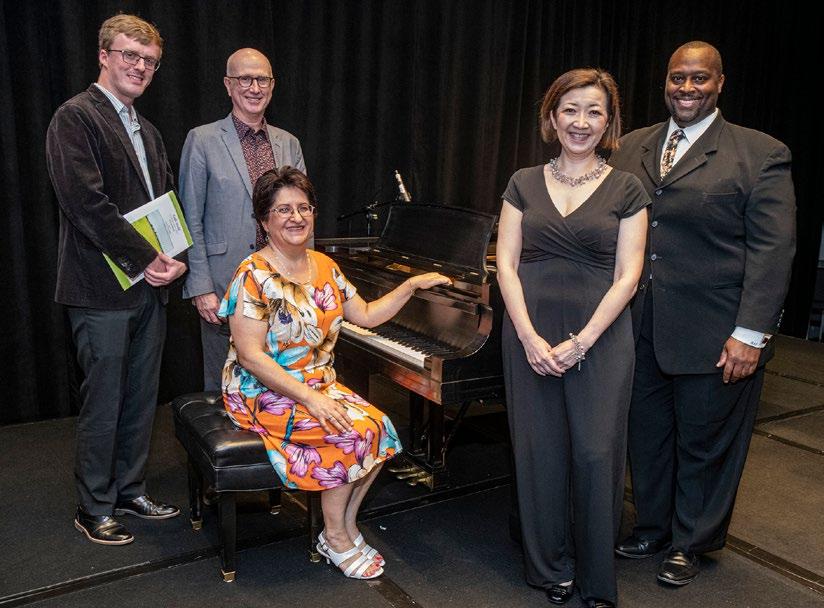
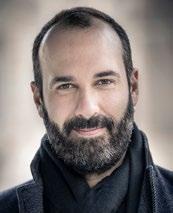
Learn more at raphaelfusco.com
Timpone (mezzo-soprano); and Michael Preacely (baritone).
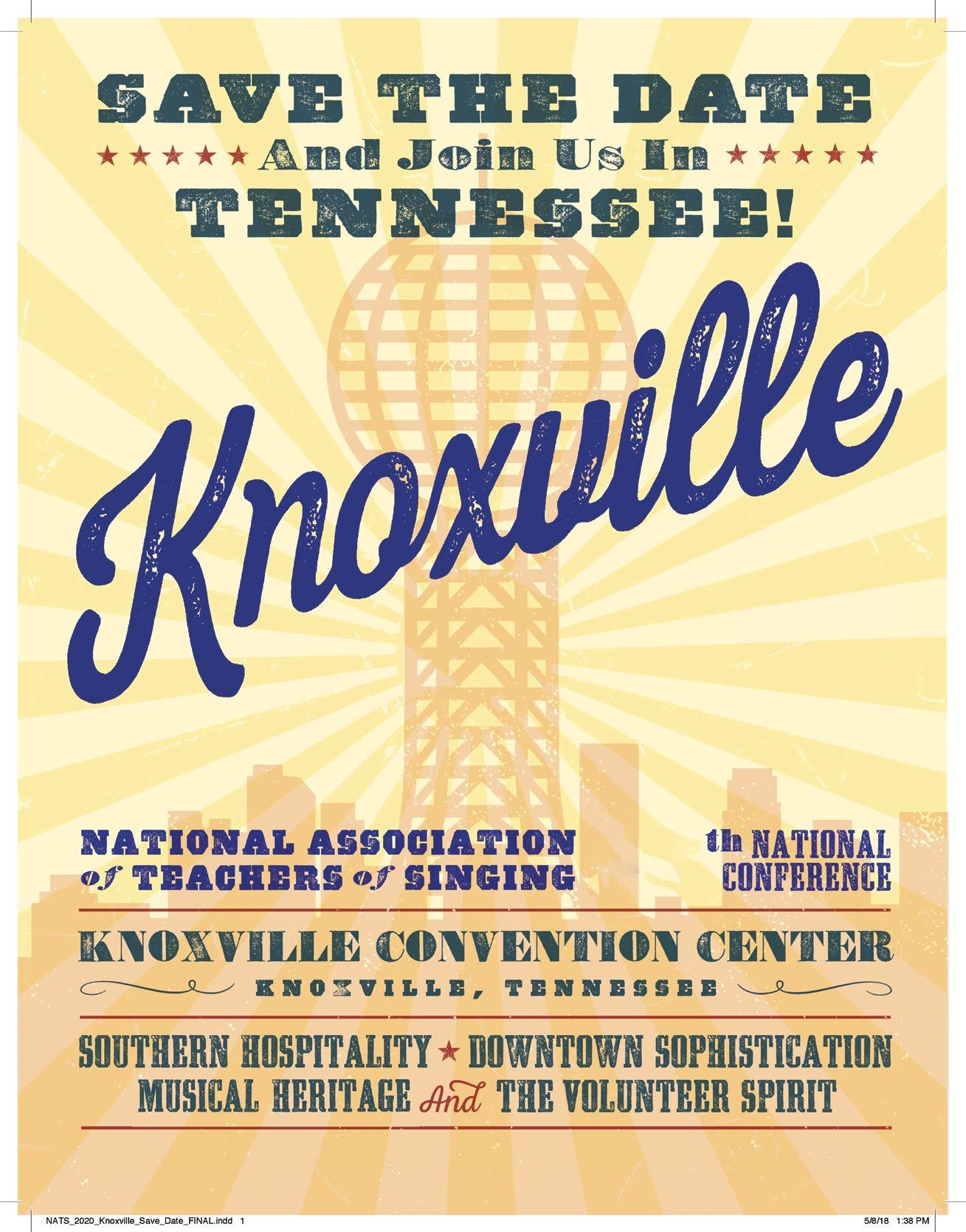
The fellowship is a joint award from The Voice Foundation and the National Association of Teachers of Singing.
The National Association of Teachers of Singing and The Voice Foundation have named Christian Herbst of Puch bei Hallein, Austria, as the 2023 Van L. Lawrence Fellowship Award winner. The honor includes the opportunity for Herbst to attend the annual Symposium on Care of the Professional Voice along with a $2,000 award toward his proposed research.
As a full-time voice scientist and singing teacher, Herbst focuses on both basic voice science as well as the acoustics and physiology of the singing voice.
In his proposal, Herbst states that there is a “fundamental conceptual mismatch” in current voice research.
“The singing voice is produced to be perceived by listeners, but measurement and assessment methods mostly focus on the acoustical properties of the generated sound,” Herbst says. “Given the non-linearities of human sound perception, respective research findings — while being scientifically correct — are thus inconsequential to a certain degree.”
Herbst intends to study this topic in collaboration with David Meyer of Shenandoah University and Brad Story of University of Arizona.
The research plans involve a new assessment to “quantify the perceptual aspects of the voice range profile (VRP) measurement,” or said another way, to measure the “carrying capacity” (German: Tragfähigkeit) of a singer’s voice across the whole range. He aims to identify pitch combinations and musical dynamics where the voice is “particularly well-suited for non-amplified stage singing with respect to perceptual loudness.”
With this research, Herbst hopes to uncover findings that will inform long-term assessment of functional singing voice development and Fach assessment.
“As such, the lessons learned in the course of this research project will not only influence my own teaching experience, but have the potential to permeate and transform pedagogical
approaches across the world-wide community of voice teachers,” Herbst explains.
Christian T. Herbst is an Austrian voice scientist. With a master’s degree in classical voice pedagogy from the Mozarteum University Salzburg, Herbst has taught more than 5,000 lessons as a singing voice pedagogue for nearly three decades.
Driven by his interest in the physics and the physiology of voice, he enrolled in a doctoral program in biophysics at the University of Olomouc (Czech Republic) from which he graduated in 2012. He has been active as a fulltime voice researcher ever since. Herbst is affiliated with the vocal studies department at Mozarteum University Salzburg and serves as an adjunct guest professor for the Janette Ogg Voice Research Center at Shenandoah Conservatory in Winchester, Virginia.
The focus of his scientific work is both on singing voice physiology and on the physics of voice production in mammals. He has received several international scientific awards, and has published in several top publications including the Science journal as well as a number of articles in the Journal of Singing and the Journal of Voice
Herbst also joined fellow voice scientist Jan Svec as a guest on the 2021 December NATS Chat, “Registration: The Snake Pit of Voice Pedagogy,” which was co-hosted by The Voice Foundation.
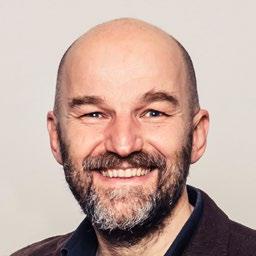
Learn more at christian-herbst.org
The Van L. Lawrence Fellowship was created to honor Van L. Lawrence, M.D., for his outstanding contribution to voice, and particularly to recognize the importance of the interdisciplinary education he fostered among laryngologists and singing teachers. The Voice Foundation and the Foundation Heritage Fund of the NATS Endowment award it jointly. Read more about the Fellowship at nats.org
Participants in the NATS Mentoring Program for Composers share their experiences.
Lots of ideas and creative dialogue have been exchanged since the National Association of Teachers of Singing (NATS) announced the pairing of 10 emerging composers with established art song composers for its Mentoring Program for Composers this past October.
Designed to encourage the composition and creation of new works, this is the third time NATS has offered the program. Mentee and mentor pairs meet individually about once a month online from October to June. Depending on the needs of the mentees and their interests, the mentors help review their work and provide guidance about the nuances of writing for voice. The program is free, and there is no cost for composers to apply.
Vocal composers Lori Laitman and Tom Cipullo serve as co-advisors, and both are participating again as mentors. As the cherry on top, each mentee composer has been commissioned to write a new work for a digital concert in June presented by Cincinnati Song Initiative. Past mentees also have had the opportunity to present their works as part of NATS events at the chapter, region or national level.
The 2022-23 pairs:
Mentee Mentor
Stephen Bachicha
Spicer Carr
Hans Bridger Heruth
Jordan Knapp
Mikeila McQueston
Nailah Nombeko
Stephen Eddins
Tom Cipullo
Lori Laitman
Steven Mark Kohn
Tom Cipullo
Kurt Erickson
Kian Ravaei Richard Pearson Thomas
Emily Sullivan
SiHyun Uhm
Nkeiru Okoye
Nkeiru Okoye
Tyler Weakland Lori Laitman
Mentee Jordan Knapp, paired with mentor Steven Mark Kohn, has found the NATS program to be very valuable.
“My experience with my mentor, Steven Mark Kohn, has been excellent,” Knapp says. “He has been quick to respond to questions, very flexible about meeting times, and checks in on my progress regularly. The comments he offers are always insightful and he is always clear that they are just opinions and suggestions, that I should trust my instincts if I don’t feel the same way. He has also offered information about ways I can be paid for my music and advice about networking as a composer.
Kohn, too, has enjoyed being a mentor.
“It has been a pleasure working with Jordan Knapp,” Kohn says. “Jordan has pretty clear ideas about what he wants to do, so I act more as an extra set of ears and a dramaturg. We discuss storytelling, clarity, and various editorial considerations. I find his instincts quite good.”
Mentor Richard Pearson Thomas expressed similar sentiments about his mentee.
“I am having a great time working with Kian Ravaei who is both talented and personable,” he says.
Likewise, mentee Kian Ravaei said his experience has been “wonderful.”
“He [Richard Pearson Thomas] has provided amazing musical advice — leveraging his decades of experience as a vocal composer — as well as invaluable career advice,” Ravaei says. “This program has immense value, especially for someone like myself who is lacking in real world experience with vocal music, and needs to rely on the experience of experts. I would encourage any composer with a passion or curiosity for vocal music to participate. I’m looking forward to continuing to share my drafts with my mentor, and hear the music of the other fellows at the virtual concert.”
In the coming months, the Cincinnati Song Initiative will record a song from each composer mentee and share these 10 world premieres in a digital concert in June. This will be the third year for the “Let it Be New” collaboration between NATS and CSI. NATS will post the concert date and details when available.
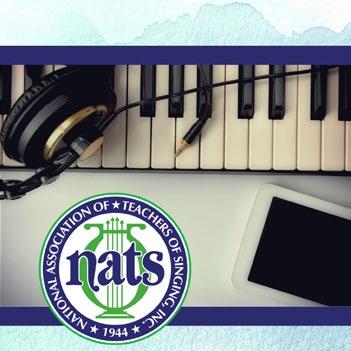
Kohn knows the concert benefits the mentees in more than one way.
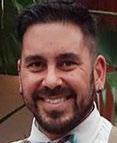
“Having a target recital date and venue is also of great value,” he says. “This enables us to encourage the composers to join ASCAP or BMI, so they can begin monitoring their performances. I am looking forward to hearing everyone’s work. Last year’s recital was a great pleasure to see.”
Mentee Mikeila McQueston, who works with mentor Tom Cipullo, is looking forward to the “Let it Be New” concert as well.

“I can’t wait to hear the exciting things my colleagues have been working on over the past few months with their mentors,” she says. She is pleased with the program and finds it gratifying.
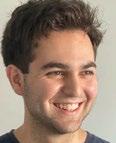



NATS is proud to offer programming that supports rising composers of new art song. In addition to the Mentoring Program for Composers, NATS holds the Art Song Composition Award each year. Most recently, NATS named Rene Orth as the 2023 first place winner. The association will accept entries starting June 1, 2023, for the 2024 Art Song Composition Award with a submission deadline of December 1, 2023. The contest awards more than $3,000 in prizes to the winner composers and provides the winners with performance opportunities. The NATS Art Song Composition Award competition is led by Carol Mikkelsen, coordinator, Lori Laitman, advisor.
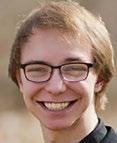
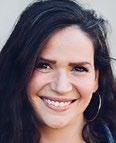
“I’ve admired Tom Cipullo’s music for years, so it’s surreal to be working with him in this program,” McQueston says. “He often challenges me to write a passage five different ways and not to settle for the first idea that comes to mind. It’s an exercise that’s simultaneously freeing and like trying to solve a puzzle, and the results have been very rewarding thus far.”
Cipullo is also mentoring Spicer Carr, who has nothing but good things to say about the program.
“Tom has been a delight to work with, and incredibly insightful,” Carr says. “Not only has it been a dream to work with such a prominent member of the field, but it has been incredibly affirming. Tom is one of the most supportive mentors I have ever had. His main concern is not correcting or ‘fixing’ my music, but rather helping me find my voice. He has encouraged me to lean into what makes my music so unique and to not shy away from writing ‘beautiful music.’”
SiHyun Uhm appreciates the support and encouragement of her mentor, Nkeiru Okoye.

“Working with a mentor has opened up interesting ideas and thoughts I would not have otherwise,” Uhm explains. “It feels like I have someone who has my back. Nkeiru supports me no
matter what and cheers me along the way. I also had a chance to meet her in person and attended Lori Laitman’s concert.”
The opportunity to receive feedback and bounce ideas with an experienced art song composer can be invaluable for an earlycareer composer.
“NATS Mentoring Program is definitely an excellent program for composers like myself,” Uhm adds. “We write music based on our influences, experiences, thoughts, feelings, and judgments. However, with a third person’s perspective, we get fresh insights and learn immensely from them.”
For the second half of the program, Uhm is looking forward to writing new pieces and getting together with other composers and composer mentors.
“I feel like the NATS Mentoring Program builds a great support group of lifelong peers of musicians,” Uhm says.
McQueston learned about the unique NATS program through past participants and plans to pass on the word to others.
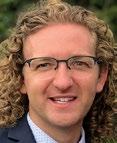
“The nature of this program is very different from a summer intensive or a single masterclass,” she explains. “Because of that, we have the time to internalize and apply feedback from our mentors, and our mentors get to journey with us through the entire composition process from inception to premiere.”
Mentoring aside, getting a commission is a big win all by itself. “Even beyond the supportive community of NATS mentors, composers, and teachers, the simple fact that it comes with a commission for an art song is hugely valuable,” Knapp explains. “It rewards composers for producing high-quality work, shows that NATS has confidence and respect for the chosen mentees, and helps to increase the repertoire for singers, with new art songs from composers of widely varying styles and experiences. I will definitely encourage other composers of vocal music to participate.”
Another benefit of the program is that these commissions bring the opportunity to work directly with new singers and receive their feedback.
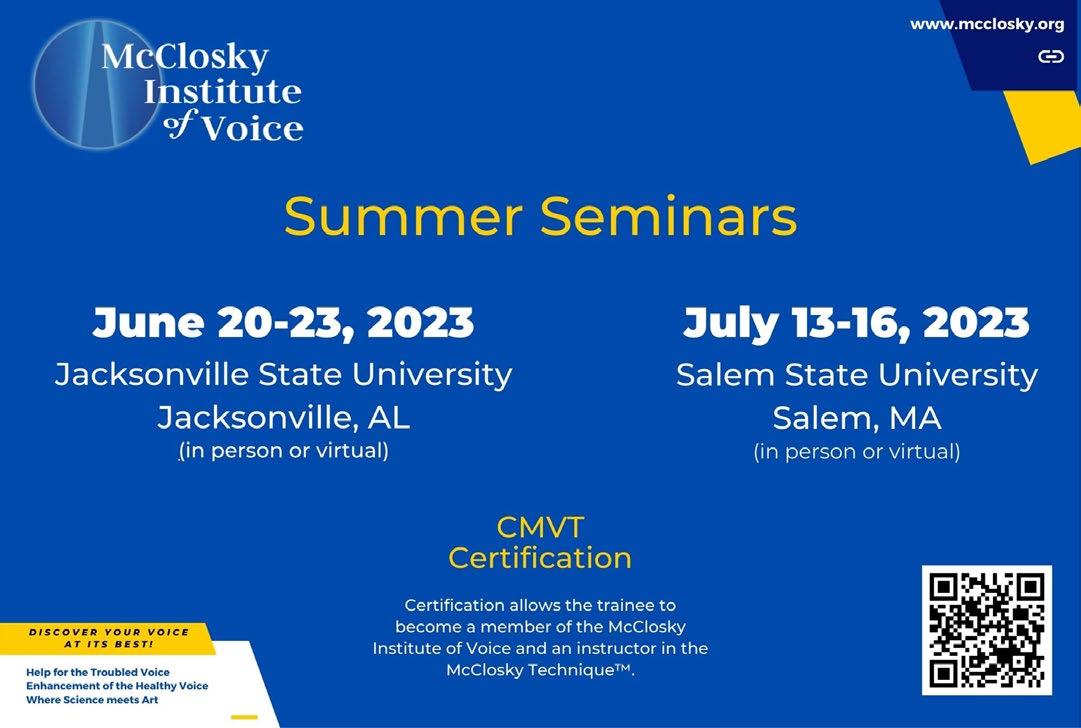
“As we enter the second half of the program, I am most looking forward to working with the performers on my
piece,” Knapp says. “In my case, it was a lot of hard work to produce one little art song, and I’m absolutely in love with the work I’ve completed. Having the support of my mentor and the commission really pushed me to produce something excellent. However, working with performers is where the piece always starts to come alive, and it’s a rare opportunity to work with performers I’ve never met before. Typically, my pieces are written for specific performers, and I will play the piano parts myself. I’m also excited for the final concert to hear the work everyone else has been doing, which I’m sure is of outstanding quality.”
Carr agrees that performance provides an exciting element to the program. He’s looking forward to listening to his music as well as receiving advice from singers.
Speaking of advice, he has some of his own to give other composers interested in this NATS program.
“I would encourage any composer of vocal music to apply,” he says. “I applied for three years in a row and finally got in on my third try. So even if you don’t get in the first round, try, try again!”
TOTAL PRIZES: MORE THAN $48,500
FIRST PLACE, SECOND PLACE and THIRD PLACE prizes will be awarded in each category.
The excitement of NATS National Student Auditions continues with a national round of competition and prizes at the NATS Summer Workshop in San Diego, July 7-8, 2023.
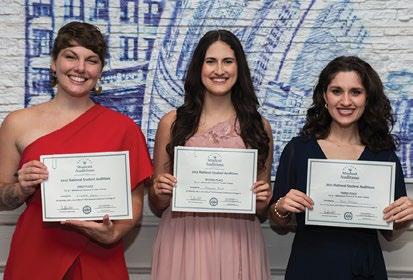
Top three singers from each category advance to final round. 1st, 2nd, and 3rd place winners receive prize money.
All singers ages 14-30 as of your regional audition date.
If you have been teaching private voice lessons for a while, you might have started with the 30-minute music lesson format. In my early years of teaching, that 30 minutes felt like a 24-hour marathon with some of my younger students. Back then, I struggled to keep students engaged. I can look back now and say that I was in survival mode in the early years of private teaching, and my teaching “toolbox” was relatively small.
As I grew as a teacher, connecting with other independent teachers and continuing my education, I applied new teaching strategies, repertoire, and performance opportunities for my students. The 30-minute lesson seemed a good fit for most young singers (albeit a tad rushed).
When I discovered that many of my young singers were interested in glee clubs, choirs, songwriting, musical theatre auditions, voice examinations and festivals, and preparing for post-secondary music programs, it became apparent to me that they needed some help with more than just technical exercises and repertoire development. They desperately needed instructions in:
• Music Theory
• Ear Training
• Sight Singing
• Audition Preparation
• Performance Opportunities
Although I had much more to offer my students, I hesitated to move away from the 30-minute lesson format. It was a successful colleague who finally talked sense to me, and I made the scary policy change and informed my employer, students, and families that I would be moving to a 45-minute lesson for ALL MY students, including the littles ages 6 and up. The transition went smoother than expected, and I only lost a couple of students who were not willing to meet the commitment level I felt was required for successful music lessons. Everyone settled in and enjoyed the longer lesson format.
I made this change over a decade ago and will never return to the 30-minute lesson.
If you are on the fence about making a change like this in your studio, I appreciate the apprehension. However, the benefits are overwhelming. Here are the most apparent reasons for ditching the 30-minute private lesson. FOREVER!
Only offering longer lessons deterred the students/families who weren’t interested in a serious commitment.
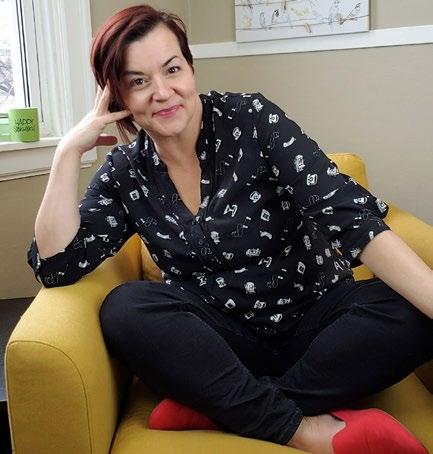
For those of you who are screaming for a better life/work balance, teaching fewer students can save you time and energy in many, many ways. You can work with fewer students in a day. I could have up to 14 students in my early teaching days in a workday. Now my max is FIVE. I have streamlined my business hours and am more energized than in the past.
The 30-minute lesson was now a stressful rush for my students and me. It was misery when they were a few minutes late. I struggled at recital time. I gave away my time for free with group lessons and endless make-up lessons. I didn’t have a family back then, and I hadn’t made peace with my business self either. I was exhausted at the end of my teaching day.
That means fewer repertoire dilemmas, emails, texts, phone calls, and follow-ups with mom and dad. Also more time for my own family.
“I made this change over a decade ago and will never return to the 30-minute lesson. “Nikki Loney
Recitals are a lot of work. The more students you have, the longer the concert will be and the more unpaid prep work and worry for the teacher.
Comprehensive music lessons include so much more than warm-ups and repertoire development. (Our piano colleagues get this! They offer fun games and “off the bench” activities to keep students engaged and learning!) In a longer lesson, you now have time to:
• properly warm up the voice
• incorporate multi-sensory activities (writing, listening, moving)
• teach to the needs of EVERY student
• solidify necessary music skills for all students
• review old repertoire (so important!)
• thoroughly introduce new songs (which facilitates better/ more successful practicing at home)
• dive into character development/acting
• incorporate fun games and activities (to keep them learning and smiling!)
• answer more questions
• explore more of the student’s interests (and yours)
• have more fun!
As with any policy change, you must give your families a timely “heads up.” This studio improvement isn’t just a time change but a financial one, so let families know with plenty of notice. You may have to explain or even “sell” the idea to some of your
students who have become accustomed to a time and price point. They may need some time to ponder all the excellent reasons you give them! As with any change, be prepared to lose a student or two. It is always sad when they go, but you will find someone even more excited to take their place!
If you are concerned about losing long time students, you might choose to allow legacy students to keep their 30-minute lesson for a semester or period of time, and encourage them to move to the 45-minute classes in the future.

As a parent with a young son involved in many different activities — none of his activities are only 30 minutes. The minimum time is usually 45 to 60 minutes. I am thankful for this as he has more time to enjoy the training, and I can take that time to enjoy a coffee and think about exciting new studio resources. Switching to a longer lesson format was one of my top five game-changers in my teaching career. Not long ago, it was standard practice to teach short half-hour lessons. Times have changed. (See what I did there?)
Adapted and reprinted with permission from FullVoiceMusic.com, “Death to the 30-Minute Lesson” December 2019.
Nikki Loney, voice teacher and content creator, challenges teachers to redefine what a singing lesson looks like for a child. Founder and CEO of FULL VOICE Music, she works with music education specialists, children’s composers, and musicians to create music education resources for the young vocal student. She is an active member of NATS, and The FULL VOICE Podcast (part of the NATSCast Network), serves the independent voice teacher and has a global audience.
“As with any policy change, you must give your families a timely ‘heads up.’ This studio improvement isn’t just a time change but a financial one, so let families know with plenty of notice.”
Most of us have met actors who also wait tables. Or visual artists who create graphic design during the day and paint at night. Or how about a bass player who works in IT and gigs on the weekend? But what about a singer who walks dogs and house sits? Yep! That’s me! My weeks consist of dog walks each morning (either my own dog or a client dog), teaching, prepping for a jazz gig, a dog walk in the evening, and settling in with dinner and a Netflix show in someone else’s house. A long-term goal of mine is to travel throughout the country housesitting, singing in the evening, and enjoying some travel as a happy way of life.
I have consistently lived a “gig life” as a singer, choir member, church music director, and studio voice teacher. In 2007, I created my studio, Groh Music and registered it with the state of Colorado as an LLC. I base my teaching philosophy off of a book titled, “The Naked Voice,” by professor W. Stephen Smith of Northwestern University. “The Naked Voice” showed me the natural approach to singing and could possibly be considered the American approach to vocal technique.
In 2022, I decided I needed to explore new avenues of income and connection. I needed space and wanted to spend time contemplating career, life, and relationship choices. So, I joined an international housesitting company and began a side hustle in house and pet sitting. I completed 24 sits and met many new families. Most of my house sitting clients have become repeat customers and I am proud to say, no pets have died on my watch. But I did have a Vizsla (Hungarian hunting dog) swallow an entire rotisserie chicken in 45 seconds, bones and all! Along with enjoying different spaces and pet personalities, I began to implement self-care in the form of food, shopping, travel, and beauty product choices. I formed my house sitting philosophy as I interacted with each customer and decided what kind of homes, beds, and showers I prefer. To document my stories about my sits, I started writing a small book about the dogs, cats, fish, and bunnies I cared for. I also started a TikTok channel, Housesitter Self Care (@housesitterselfcare), to tell funny stories and impart practical tips about caring for customers’ homes and pets. These pets I sit for are always loving, fun, and great to be with. The people I serve are also very accommodating and thankful for my service. Some clients are very particular on the care they want for their pets and others leave a key under the mat trusting I will do a great job. Many of the pet owners have come to see me perform with my jazz quartet. Others have suggested my sitting services to their friends, and a few have signed up for voice lessons.
I created policies, pricing, and a system for auditions and pedagogy from the business insight of “How I Made $100,000 My First Year as a Piano Teacher” by Kristin K. Yost, the founder of Centre for Musical Minds. The book introduced me to a systematic, demographic-based structure of branding that can build a thriving successful studio business. Having both a pedagogy and a business format in my studio structure helped me believe in my teaching and my business acumen.
It is an odd combination, a professional singer watching and walking dogs, but the unconditional love I receive from the pets keeps me calm and grateful. Walking dogs and cleaning up poop, keeps me humble and real. Getting paid for doing this, helps me make a living. And meeting the owners keeps a steady flow of connection, service, and friendship in my life. Colorado is a “dog state,” so my service and expertise is a valuable commodity here.
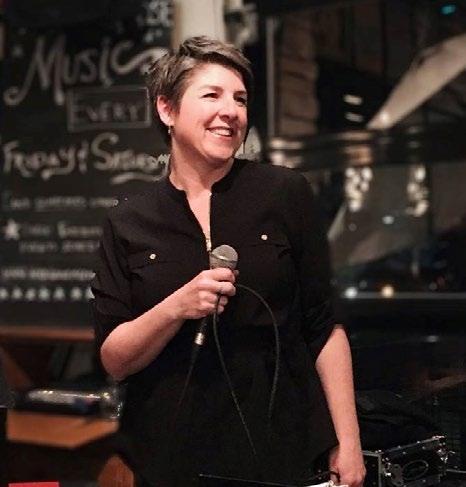
“A long-term goal of mine is to travel throughout the country housesitting, singing in the evening, and enjoying some travel as a happy way of life.”Sarah Groh
In 2023, I opened my schedule to more house sits and dog walking. I have policies and pricing, much like those that support my voice studio. I named the business, Sarah Sit & Play. Look for me on Facebook and Instagram, as well as TikTok.

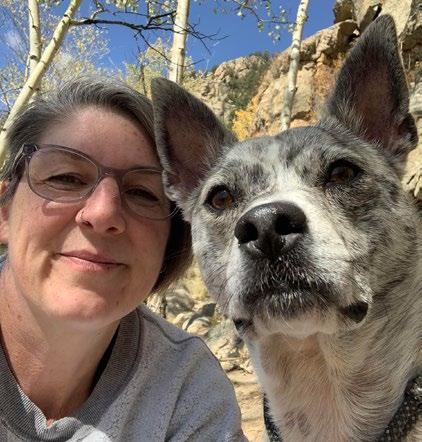
A life transformed through singing, teaching, and house sitting has given me a new outlook on life. I don’t worry about this strange combination of interests because it deeply feeds my life and spirit. I am hoping in the years to come that I can sing, and house sit in different cities, expanding both parts of my career.
Someday, you may decide you need a side hustle for money, mental health, or love and connection. Don’t worry about any combination of gigs and jobs that you feel helps create a beautiful life. Let me be the first to encourage you and give you
the permission you need. To me, a beautiful song sung well, and the companionship of a dog are both sweet music, and the presence of God in my life.
NATSCast is the official podcast network of the National Association of Teachers of Singing. NATS is pleased to present this group of podcasts offering quality resources for voice teachers and singers. These NATSCast podcasts are produced by NATS members. See more at nats.org/NATSCast and check out the following podcasts: The Full Voice, The Holistic Voice, New York Vocal Coaching, VocalFri, Too Many Frocks, and The Business Savvy Singer with Greta Pope.
Sarah Groh has a vast work experience that includes church music direction, music teaching, leadership and management, and small business setup and administration. Currently, she teaches private voice, house sits, walks dogs, and is employed by St Michael’s Episcopal Church as the communications coordinator. Groh has created arts programs collaborating with non-profits, school districts, for-profits, and military organizations. She has written studio business systems that detail marketing plans, teacher training, and enrollment processes for how to run a small studio business. She leads the Sarah Groh Quartet, a jazz group with a regular gig schedule in Colorado Springs, Colorado.
NATSCast is the official podcast network of the National Association of Teachers of Singing. NATS is pleased to present this group of podcasts offering quality resources for voice teachers and singers. These NATSCast podcasts are produced by NATS members. See more at nats.org/NATSCast and check out the following podcasts: The Full Voice, The Holistic Voice, New York Vocal Coaching, VocalFri, Too Many Frocks, and The Business Savvy Singer with Greta Pope.
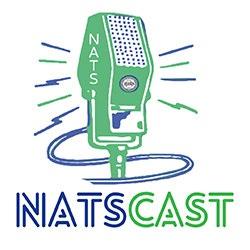
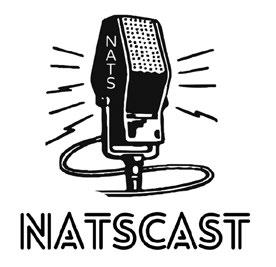
“It is an odd combination, a professional singer watching and walking dogs, but the unconditional love I receive from the pets keeps me calm and grateful.”
Executive













Series Editor: Matthew Hoch

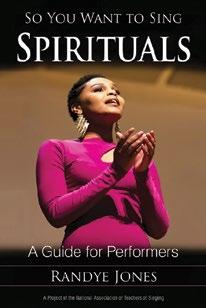
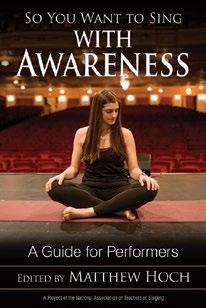






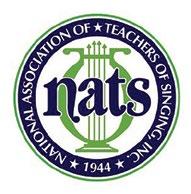
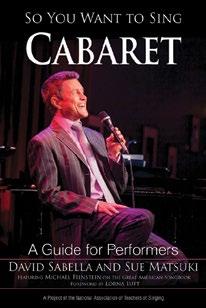
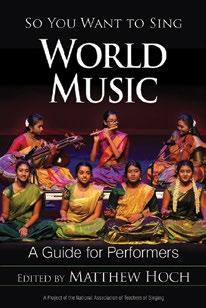
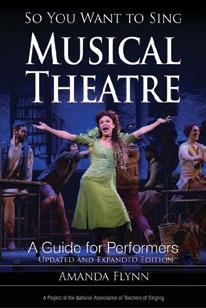
























A conversation with Anna Diemer, Deborah Conquest, and Cynthia Vaughn
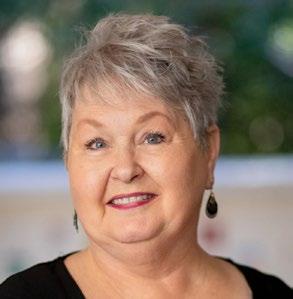
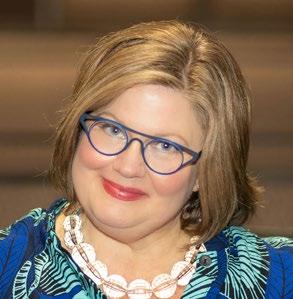
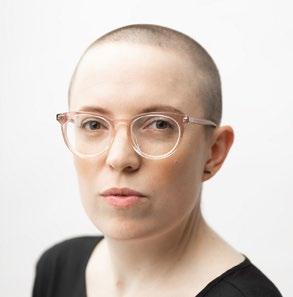
The older population is beginning to burgeon again as more than two-fifths (41%) of the ‘baby boom’ generation is now age 65 and older” according to the US Department of Health and Human Services. Many of these older adults are “aging in place” and may not drive or have someone to take them to weekly in-person voice lessons. Online lessons are a bright spot of socialization, creativity, and learning. NATS members Anna Diemer, Deborah Conquest, and Cynthia Vaughn share the benefits and joys of working with this special demographic.
What is it that you enjoy about teaching older adults? Did you teach older singers online before 2020?
Deborah: One thing I love about teaching older adults is they are just so happy to be making music again. Many of them are picking up singing after a long hiatus or after a significant time away from reading music or significant hormonal changes and they’re not sure what to do with their voice now. I had not taught older adults online prior to 2020.
Anna: I enjoy helping my older adult clients rediscover their voices — many of them have not had any formal vocal study since their teens or 20s, and both their own voices and vocal pedagogy have changed a lot since then. It is rewarding to lead them through this process of regaining function and ease in the voice that some of them had dismissed as a relic of the past. I find that my older adults also enjoy learning how the voice works, so I get to nerd out with them over pedagogy.
Cynthia: I didn’t teach online until 2020. Now I find it much easier to teach older students online than in person, especially
when the singer has visual or hearing challenges. In person, the student would sometimes have trouble hearing me on the other side of the piano or across the room or seeing my facial expressions. If there were other noises in the hall or street noise, that made hearing more challenging. With an online lesson, the student and I are close up “face to face” on screen. I like using gallery view so that the student and I are side by side on screen. It helps them feel like we are in the same room and they can mirror my alignment or vowel shape. I don’t have to shout to be heard. I simply turn up my microphone and ask the singer to turn up their speaker.
“I don’t think we give enough credit to the adaptability of people in their 60s, 70s, and 80s. The octogenarians were born during World War II and have seen more changes and technological advances than we can imagine.”
Anna: At the beginning of the pandemic, I sadly lost a few students because they were unable or unwilling to make the switch to online lessons. Most, though, were eager to keep singing, so I tried to accommodate them in any way that I could. With this population, I mostly used FaceTime and Skype and my folks didn’t have trouble with the online technology. In the beginning, we had the typical audio, latency, and internet
connectivity problems that everyone had while figuring out the shift to going online, but once that was settled, I found that my clientele in this demographic increased! I have taught several clients how to use ForScore PDF reader on their iPads, which provides convenience and improves accessibility for these singers. Several times, I drove out for a socially-distanced outdoor lesson in one client’s butterfly garden for a change of pace, which was delightful. We made it work!
Deborah: The ones who have continued online are pretty quick to adapt to the online platform. Maybe it takes a few more reminders about turning on your “Original Sound” and adjusting the camera. I also go through all of their Zoom settings at the beginning of every lesson.
Cynthia: I don’t think we give enough credit to the adaptability of people in their 60s, 70s, and 80s. The octogenarians were born during World War II and have seen more changes and technological advances than we can imagine. All of my students got a free “tech set up” session with me in 2020. My student Charlotte, now 87, bragged that she taught her family how to use Zoom during the pandemic lockdown! If we have any technical difficulties or Wi-Fi outage during a lesson, we switch to FaceTime on their phones or just do an audio lesson.
What are the benefits of online lessons for your older adult students?
Anna: One concern of my older adult clients is “aging out” of their choirs. I think private study helps give them the confidence as well as technical prowess to keep singing as long as they would like to, in the ensembles that they would like to. Several of my retired singers perform with upwards of three choirs each, and I’m grateful for the opportunity to help keep them in good vocal shape so that they can continue to enjoy the camaraderie and stage opportunities of their organizations.
Deborah: Many of my older students are no longer driving and are dependent upon rides from other people. I have one student who lives in a senior living facility and even when that facility is on a lockdown due to influenza or COVID, we’re still able to have our voice lesson. I think socially, it’s also a good way for them to keep active and keep their social circle wider than perhaps before.
Cynthia: The convenience and inclusion of online lessons can’t be overstated. Some older students don’t drive or they or a spouse are immune-compromised. Online one-on-one lessons help with mental acuity, socialization, isolation, and bring pleasure. One student looks forward to her Wednesday lesson every week. “It’s my favorite thing!”
What kind of repertoire and styles of singing do your older adult students enjoy?
Anna: The vast majority of my older adult clients are active in their local community and church choirs, which gives us an endless supply of repertoire to sing! I love it when a singer shows up with their score full of sticky notes so that we can address certain phrases in their lesson. Choral-orchestral repertoire is the studio top hit, and we also work on sacred solos when those opportunities arise at church.
“I feel that I have learned a lot about what happens to the voice throughout the lifetime so that I can hopefully age as gracefully as my clients have.”
Deborah: They seem to love classical music. One of my 80-something-year-old students didn’t want to sing Christmas songs — she wanted to sing all of the soprano arias from Handel’s Messiah! And she did so with great success. They also love the great American songbook, Frank Sinatra, Bing Crosby, Rosemary Clooney, etc.
Cynthia: Some of my older adult students sing in their church choir and/or community choir. I will sometimes reach out to their choir director and ask for a PDF of their choir music so that I can help them in their lessons. My 87-year-old student also sings classical. She studied with THE Burton Coffin in the 1960s. One student in her 70s has a great low (tenor?) voice and she loves to sing folk ballads and protest songs from the 1960s — Peter, Paul, and Mary; Bob Dylan; Joan Baez. She recently taught me Ian and Sylvia’s “Four Strong Winds” that has been covered by a lot artists including Neil Young. Oh, and she loves Ed Sheeran!
Are your students still performing in choirs or community shows? How do you keep them motivated in lessons if they have “retired” from performing in public?
Anna: Most of my older students are still singing in choirs. I hope they will never retire from singing!
Deborah: One of my students actively sings in her church choir as well as her senior living facility choir. Almost all of them participate in some sort of karaoke! Another student sings at hospice bedside.
Cynthia: Most are still singing in choirs, but not always. The ones who aren’t singing in public, enjoy their lessons for fun,
learning, and socialization. Their stories are as important as vocal technique.
What do you, the teacher, learn from working with this population?
Anna: As an AFAB person in their 30s, I feel that I have learned a lot about what happens to the voice throughout the lifetime so that I can hopefully age as gracefully as my clients have. I can also help ease this transition for my clients who are just beginning that journey. And, of course, I love listening to their stories!
Cynthia: I’ve learned to be a better listener and to teach slower lessons. It’s ok if we only get through one or two songs. Call and response works well, and I try not to rush or talk-over the conversation or song.
Deborah: I’ve learned some new repertoire, particularly songs from the 1920s and 1930s that maybe were new to me. I find that if I wait a little longer than usual in the back-and-forth of conversation, they’re able to hear and understand me better. I’ve learned so much as a teacher and my life is richer for working with this population.
Anna Diemer (they/them) is a professional singer, arts entrepreneur, and the owner of Diemer Voice Studio, LLC in Asheville, North Caroina, and online. They help singers unearth and unleash their inner voices, working with singers who have had vocal injury, are experiencing voice dysphoria, or just want to sing healthily throughout their entire lifespan. When they’re not singing, Diemer enjoys whipping up new recipes in the kitchen, spinning and hiking to stay active, and crushing their to-be-read pile.
Deborah Conquest, soprano, is a teacher and owner of Conquest Voice Studio in Rochester, New York. She loves hiking, rockabilly music, competitive powerlifting, houseplants, being a stage mom and chocolate cake — not necessarily in that order. She received her master’s degree in music and doctoral studies from Cincinnati Conservatory of Music (CCM), bachelor’s degree in music from SUNY Fredonia (New York), and Honors Certificate from Eastman Preparatory Pre-Collegiate.
Cynthia Vaughn is an author, teacher, and clinician who recently moved across the country from eastern Washington state to eastern coastal Virginia. Online teaching has allowed her West Coast students to continue their voice lessons. She has become skilled at converting time zones as she adds students from other parts of the country. Vaughn enjoys working with voice teachers and avocational singers. She has special fondness for working with older singers because, “at age 65, they keep me young!”
Graduate programs offered in vocal performance and collaborative piano (vocal coaching)
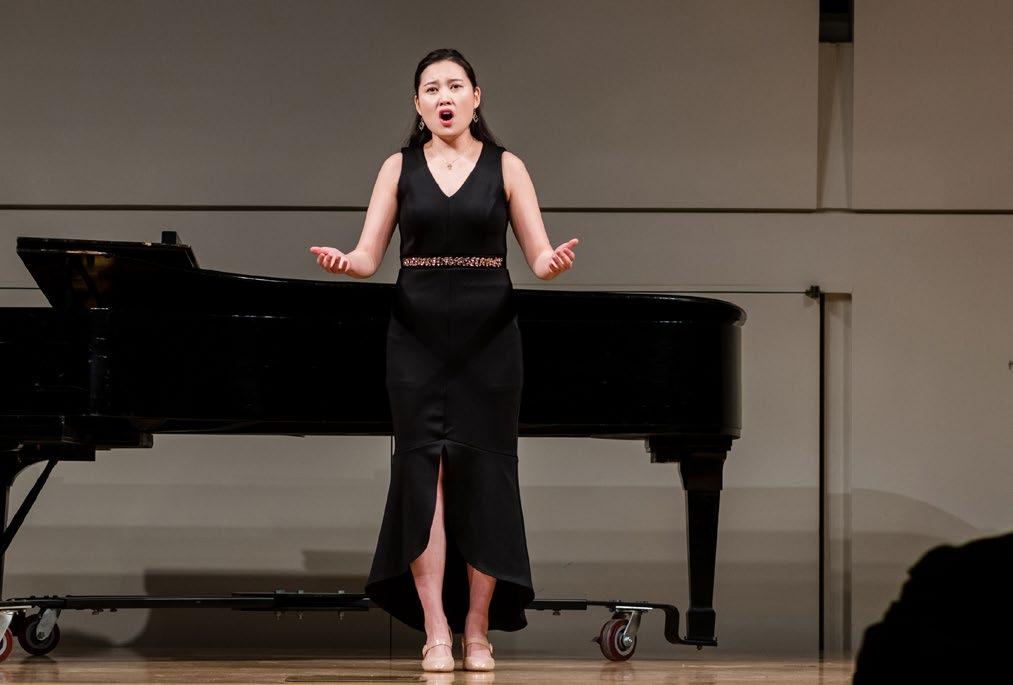
For more information, contact:
Erin MatonteAssistant Director of Music, Art, and Theatre Recruitment

773-244-4583 | ematonte@northpark.edu
www.northpark.edu/music
(6-7 P.M. CT; 5-6 P.M. MT; 4-5 P.M. PT)
*Unless otherwise noted
NATS Chat invites participants to network and discuss various topics in an online webinar. Sessions are often held the second Sunday of each month of the academic year. The host and coordinator for NATS Chat is Kari Ragan.


A Balance in the Force: Producing, Perceiving, Measuring and Assessing Vibrato
Featuring John Nix, Josh Glasner, Yvonne Gonzales Redman, and Theodora Nesterova

Vibrato can be defined as a periodic variation in some acoustic aspect of a singing voice, including frequency, intensity, and timbre. How it is produced, how we adjust it as singers in different venues and in different musical contexts, how we as skilled listeners perceive it, how voice analysis programs measure it, and how we assess what vibrato can tell us about the functioning of a singer’s voice have fascinated each of the guests for this chat. The presenters, all active as singers, teachers, and researchers, bring a number of years of experience exploring vibrato from a variety of perspectives. This NATS Chat will provide up-to-date information on vibrato research, including that performed by the authors, and will offer suggestions on how to enhance vibrato listening skills in the studio.
Special time: 2 p.m. ET/ 11 a.m. PT
Singing Voice Specialist: Controversies and Collaboration Part 2

Featuring Peggy Baroody, Leda Scearce, Marci Rosenberg
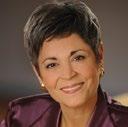
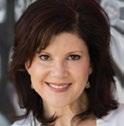
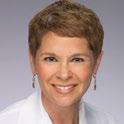


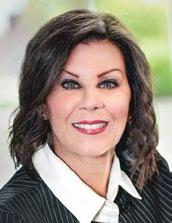
During the 2021/22 NATS Chat season, this group discussed that the importance of the voice team in caring for a singer with an injured voice has become more accepted in the past couple of decades.
Since there remains ongoing discussion, sometimes controversial, about scope of practice between the speech language pathologist and voice teachers in caring for this population of singer, we felt it was important to discuss those aspects. This NATS Chat will go deeper in exploring this important topic. It will include specifics about the work in the clinic and/or voice studio with our clientele.
Learning about Latin American & Spanish Song (101)
Featuring Juanita Ulloa, Adrianalía Moutz, and Omar Herrera Arizmendi
Join three dynamic musicians for our final NATS Chat of the 2022-23 season about songs in Spanish! We’ll share a list of the latest doctoral dissertations, books, and sheet music in this rapidly growing field. Learn techniques to accompany classical and commercial vocal music on the piano, and we’ll discuss important terminology to be aware of when referring to vocal music from the 26 countries that speak Spanish. Host Kari Ragan welcomes vocal artists Dr. Juanita Ulloa (Operachi singer/ specialist in Mexican and Latin American song) and Dr. Adrianalía Moutz (classical singer/specialist in art songs from Spain), along with Dr. Omar Herrera Arizmendi (pianist/CEO of Ponce Project) for this chat. We are so much more than Latinx!
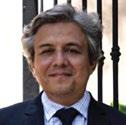

Register and view schedule at NATS.org. Watch past chats on the @OfficialNATS YouTube channel.
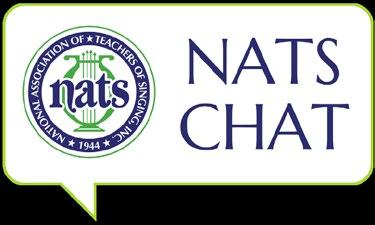
NATS members and friends are invited to submit proposals for special sessions to be presented at the 58th NATS National Conference in Knoxville, Tennessee, June 28 – July 2, 2024. Preference will be given to proposals with two or more presenters. Proposals related to the following topics are particularly encouraged:
• Body Work Modalities
• Collaborative Piano/Coaching
• Commercial Music Pedagogy
• Composers (proposals by composers/teams of composers, singers and pianists)
• IDEA (inclusion, diversity, equity, anti-racism)
• Peak Performance
• Teaching the Young Singer
Proposal guidelines and format are posted online at NATS.org
DEADLINE: JUNE 1, 2023
The National Association of Teachers of Singing invites all NATS members and friends to submit abstracts for presentation consideration in poster paper format at the 58th National Conference in Knoxville (June 28 – July 2, 2024). Topics for poster papers may include:
► Voice Pedagogy
► The Private Studio
► Vocal Repertoire
► Commercial Styles
► Voice Science
► Technology and Teaching
► Performance Practice
► Musicological Studies
... or any other topic related to the art and science of singing and teaching singing. Abstracts should not exceed 500 words in length and should be uploaded in PDF or Microsoft Word format as a file attachment through the submission portal at nats.org. Only electronic submissions will be considered.
To submit a poster paper proposal: Visit nats.org and complete the online application. You will be asked to upload your abstract through the online portal. Only online submissions will be accepted.
NATIONAL ASSOCIATION OF TEACHERS OF SINGING
June 28-July 2, 2024
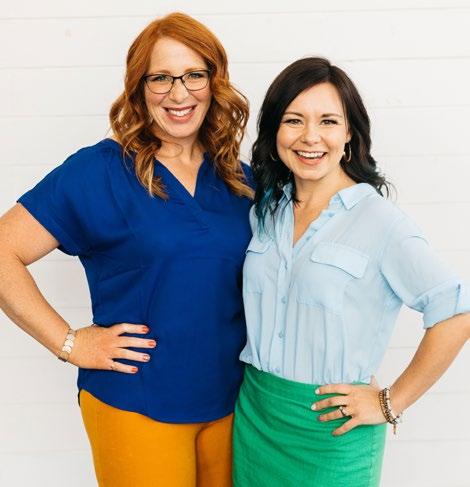 by Cynthia Vaughn
by Cynthia Vaughn
Let’s face it. “Group Voice” in the independent studio has had a serious image problem. As a voice teacher community we’ve been discussing the benefits of small group learning for years. Research and practice have shown us that group study is a highly beneficial way to learn. There are also financial advantages to both clients and teachers. However, we’ve lamented the lack of buy-in from clients. Most parents and students have been conditioned to believe that private lessons are always best. Some studios, like Christin Coffee Rondeau’s studio (cofounded with flute teacher Sarah Robertson), are leaning into small group classes and rebranding them as “semi-private lessons.”
Inter Nos: Your studio, Sand Dollar Music in Centerville, Ohio, has recently rebranded group voice class as “semiprivate lessons.” Brilliant! How are clients responding to this concept of “elevated” group voice study?
Christin Coffee Rondeau: Thanks! I’ll be honest: I’m sure I didn’t coin the term “semi-private lessons” (I can’t remember where I first heard it), and there are lots of other studios out there doing lessons like this. I’m following in a long line of smart studio owners like Sarah Bucher, Cara Transtrom, and many others who had the foresight to figure out this model, and I’m grateful for their work and inspiration!
So far, clients seem to be responding well. They’re excited to see their kids gaining skill and confidence through working in these small groups. I think we (voice professionals) tend to think of 1:1 lessons as the standard because that’s what we were raised with, but families who are new to voice training don’t necessarily have that expectation coming in, so it’s easier to explain the model to them. (Whereas it took me years to offer semiprivate lessons because I’ve taken private lessons my whole life and just couldn’t imagine how it would work — I had that “curse of knowledge” bias!)
Inter Nos: What ages do you teach in semi-private lessons? How many are in each group? How did you determine the age groups and what does it mean to “carefully curate” the groups? Are students auditioned?
CFF: We have two course options now — ages 7-11 and ages 12-15. When there’s a demand — and I believe there will be soon — we’ll offer a class for the younger ages as well.There are between 4-8 singers in each group. 8 is the max for sure.
We broke down the ages based on a number of factors, including typical attention spans, emotional maturity, and vocal development. One of our goals for the classes is to build camaraderie and a sense of community, and we wanted singers to be in similar age groups so they could work on repertoire together and cheer each other on from a place of empathy and solidarity.
When we say the groups are “carefully curated,” we mean that we’re thoughtful and intentional about the needs, goals, and personalities of each singer in the class—how they’ll interact with the other students, what additional support or information they might need from the teacher, and what kind of repertoire and activities will serve them well, keep them engaged, and set them up for a lifetime of confident, joyful music making.
“Working in intentional community with other singers reinforces for them that they’re not alone in what they’re experiencing and that they’re not doing anything ‘wrong.’ Pre-teens and teens are so quick to blame themselves for any difficulty in their singing!”Sarah Robertson and Christin Coffee Rondeau, Sand Dollar Music
Students are not auditioned, but the teaching team is continually assessing what kind of support they need and how we can best help them grow.
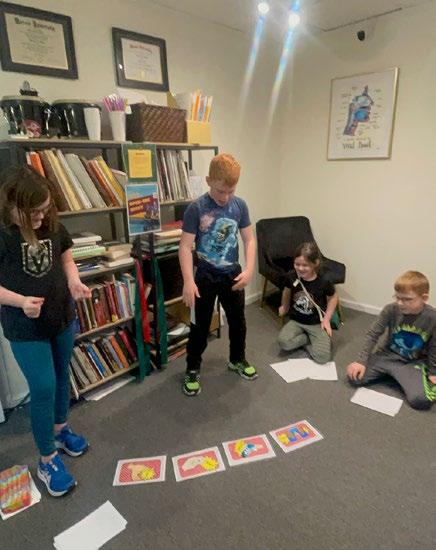
Inter Nos: Your inaugural classes are January 2023 – May 2023. Will there be year-round classes next Fall? Can students join after the start date?
CFF: Yes, this program is relatively new, but we plan to continue it indefinitely. Students can join after the start date — we just pro-rate the missed lessons. Eventually, I think we’ll get into a year-round flow of enrollment.
Inter Nos: What are the benefits of group study for youth and teen singers?
Great question! The pre-teen and teen years are when we typically see singers transition out of general music classes and children’s choirs and into private lessons. However, those years can be pretty isolating for singers. Their voices are changing at a rapid pace, and it can feel frustrating, overwhelming, and lonely, no matter how careful we are to reassure them. Working in intentional community with other singers reinforces for them that they’re not alone in what they’re experiencing and that they’re not doing anything “wrong.” Pre-teens and teens are so quick to blame themselves for any difficulty in their singing! For singers who are intimidated by performing alone, semi-private lessons offer the option to work in duets and trios rather than focusing on solo work. And for singers who really want to learn to sing parts and harmonize by ear, they have built-in practice partners. They can work on a variety of repertoire in an environment that allows them to learn to trust themselves and each other.
Inter Nos: What are the benefits for the families?
Tuition is lower than private lessons, which is a huge benefit for many families! They also have peace of mind knowing that their kids are developing a new skill in a team environment where they are challenged, valued, and encouraged by both teachers and students! It’s also not necessarily an “either/or” thing. We have some families who opted to keep their private lessons and use the voice class as a supplement to what’s happening in lessons. That’s really exciting!
Inter Nos: What are the benefits for the teachers?
It helps us serve a greater number of students in less time. We only have so many hours in the day, and we would rather work with people ASAP than put them on a wait list until a private lesson spot opens up! (Which could take months or even years depending on the teacher!) For those of us who are extroverts, it also adds variety into our teaching day, as the emotional pacing and output is very different in private lessons vs. semiprivate lessons.
“There are between four to eight singers in each group. Eight is the max for sure.”
Inter Nos: Do you plan to add semi-private lessons for adults in the future?
I would LOVE that! Got any advice for me? :)
Inter Nos: Finally, what is your advice for teachers who would like to incorporate semi-private lessons into their own studios?

1. Don’t overthink it. You’re going to want to get everything perfect. And you won’t. And that’s ok, because just like singing, teaching is an imperfect work. It’s ok to acknowledge to your students and their parents that they’re
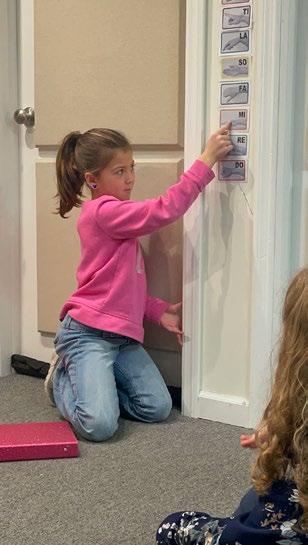
part of something new and that you appreciate them journeying with you.
2. Plan more activities than you think you need. Kids’ and teens’ attention spans and interests can be all over the place, so at least at first, you’re going to want to spend some time lesson planning and developing your “bag of tricks” so that you can keep them engaged (and, to quote our beloved Nikki Loney, “Compliance does not equal engagement.”).
3. Ask them what would make the class meaningful to them — do it both in person in class and privately through their
parent via email/Google survey/etc. It’s easy to customize the course to the learner, but you have to know what they want to learn first.
4. Get well-versed in contemporary music. They’re going to want to sing the songs that they love, and we get to help them select repertoire that serves their voices and goals.
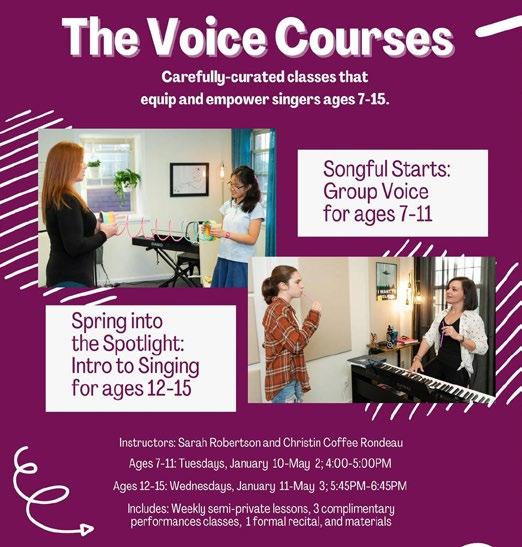
5. Have a plan, but stay flexible. If the class is really locking on to a particular activity, song, or concept, go with it! There will always be time to get back to the lesson plan, so enjoy the freedom of spontaneous collaboration when it arises!
Soprano Christin Coffee Rondeau is obsessed with voices. Hers. Yours. Everyone’s. What makes them soar, shine, swing, and sparkle. She holds a bachelor’s degree (Mercer University) and master’s degree (Miami University) in vocal performance, along with training in Orff Schulwerk and Estill. A warm and versatile performer, her repertoire spans from art song to musical theatre to opera to jazz standards. There’s not much she won’t sing, but she’s happiest when collaborating on challenging musical projects with good friends. Her writing has been featured in the 4th Edition of Robert Sataloff’s “Professional Voice: The Science and Art of Clinical Care,” in several NATS Inter Nos issues, and at The Full Voice. She has been a guest on The Full Voice, The Voice Culture, and Vocal Fri podcasts. She serves as community manager and copy writing coach for The SpeakEasy Cooperative and has presented at conferences for the National Association of Teachers of Singing and The SpeakEasy Cooperative. Coffee Rondeau is co-founder and voice and piano studio director of Sand Dollar Music in Dayton, Ohio where she works with singers and teacher-singers — helping them make the sounds, art, and impact they want to make. In addition to her work as a teacher/ singer, Coffee Rondeau is an aspiring aerialist, regularly training on aerial silks and Lyra. Find out more or get in touch at sanddollarmusic.com
Intermezzo is a weekly compilation of news clips about the singing profession, in addition to NATS news, that is delivered to each member’s inbox. Intermezzo tackles today’s most relevant issues, gathered from sources like The Associated Press, The New York Times, Financial Times and the leading industry publications. It is delivered to the inboxes of teachers of singing in the United States, Canada and more than 35 other countries.
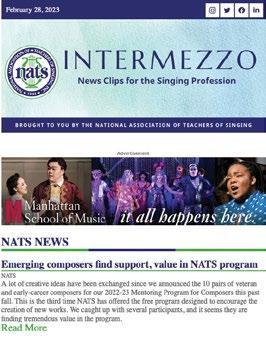


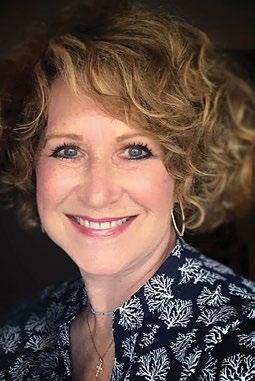
Since independent teachers make up over half of our membership, I was delighted when Cynthia Vaughn, Independent Voice associate editor, reached out to me to answer some questions about what plans NATS has for independents. Not many members know that I began my career as an independent voice teacher and continue to teach private students. I always have found it challenging, inspiring, and rewarding to work with singers of all ages on a variety of repertoire styles. Teaching singing, whether as an independent teacher or in the university setting, enables us to live out our passion, one student at a time.
Little did we know when we gathered in NYC for the 2020 Winter Workshop, “The Complete Singer,” that three months later we would be completely locked down by COVID-19. That spring, NATS was in the process of finalizing plans for our 2020 national conference to be held in Knoxville, Tennessee, in June. Under the deft leadership of then President Karen Brunssen and Executive Director Allen Henderson, we pivoted and retooled our conference to be offered virtually. More than 2,400 NATS members gathered online to attend this conference — the largest number we have ever enjoyed! So many independent teachers were featured in both premium workshops and breakout sessions. Many of our new members and conference attendees were independent teachers whose feedback was overwhelmingly positive. Through a most difficult time, we were able to provide access to our members who were reeling from the unexpected shutdown.
In addition to producing webinars providing COVID-19 resources for singers and music educators, we began a social media campaign to educate ourselves on a new reality for many of us — teaching online. (Many independent teachers had been doing this for years.) The NATS social media pages shared ways to provide instruction and accompaniment in real time along with recommendations on equipment and software that would help us all do our best, virtually.
During the rest of 2020, 2021, and even into 2022, we enjoyed many virtual offerings at the chapter, region, and national levels.
This has increased access to professional development opportunities for teachers and increased access to our students who participate in chapter student auditions and the National Student Auditions.
Something that warmed my heart through 2020 and 2021 is how NATS members throughout our association raised funds for NATS membership renewals to assist many of our colleagues who were financially affected by the pandemic. Financial hardships may continue to affect some of our members. If you find yourself in this circumstance, please don’t hesitate to reach out to your chapter or region leaders. We want to continue to help when and where we can.
I would like to add a few more ways that NATS serves our independent teacher members through the lens of our shared Values:
• Support voice professionals within the studio, classroom, clinic, and performance venue.
• Provide committed leadership to achieve our mission and vision.
• Advance ethical principles and practice in our profession.
• Celebrate and recognize the value and efforts of all.
• Encourage individual skills and creativity.
The NATS Journal of Singing (JOS) is a valuable resource of support for our members who are independent teachers. In addition to the excellent content throughout the JOS, NATS dedicates a column to independent teachers: The Independent Teacher. JOS Editor-in-Chief, Richard Sjoerdsma, initiated this column in 2002 under the name The Private Studio and renamed it in 2012. Associate Editors, responsible for their columns’ content, often call for guest submissions. I encourage independent teachers to consider submitting articles that they would like to share with their colleagues.
Another column is this one, Independent Voices, which appears in our semi-annual Inter Nos newsletter. In this column, NATS gives special emphasis toward advancing the work of our independent studio teachers. This is a key resource for studio voice professionals offering practical solutions for non-university, independent studios and inspiring success stories of our entrepreneurial members. Send article
submissions or topic suggestions
CynthiaVaughn@icloud.com
Everyone may view the Independent Voices articles and archives
NATS also supports our members through NATS Chats, our live online real-time discussions for voice teachers and singers. From the comfort of your home or studio, you can enjoy topics that vary widely and have included classical and CM (commercial music) vocal technique, vocal repertoire, teaching strategies, business strategies for independent teachers, and arts advocacy. Guests have included prominent teachers, authors, composers, and artists.
perspectives of colleagues who have different backgrounds and expectations. NATS activities and events will benefit greatly from having diverse leadership. NATS is committed to making sure that we recruit independent teachers for leadership positions at all levels, including at the national level for national officers and national committee positions.
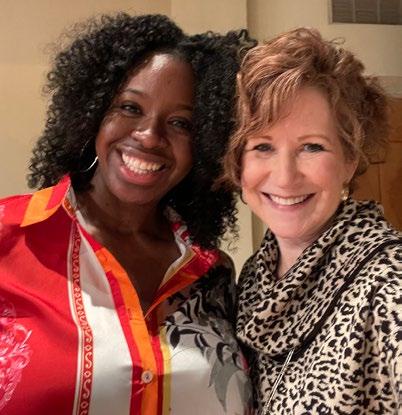
The NATS Intern Program, our innovative and immersive professional development experience, seeks to pair recognized master teachers with early-career members of NATS. Within an intensive format designed to promote the dynamic exchange of ideas and techniques, the goal is to improve substantially the studio teaching skills of the voice interns. The 2023 interns have already been identified, but if you’ve been teaching less than five years, we will be looking for the Intern Class of 2024 next December. Please consider applying.
The NATS Live Learning Center is a portal of online learning opportunities. The portal contains live recordings of sessions that were originally held in person, including NATS conference sessions and workshops. The 2022 Chicago conference presentations are available now. This is an invaluable repository of our collective expertise. You will find many of our independent teacher colleagues on these pages.
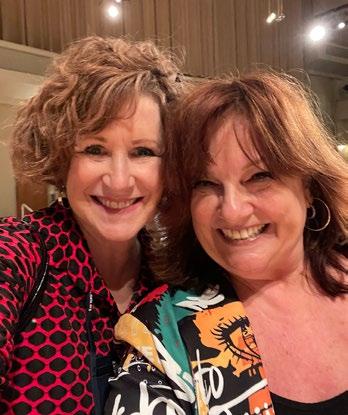
It is extremely important that NATS leadership be as varied as our membership. In our I.D.E.A. Best Practices Guide, we encourage chapter and region leaders to seek out the
NATS is committed to making sure that all NATS events and activities are inclusive and represent the diversity of our membership. Often, when we think about I.D.E.A., our minds go to ethnic inclusion, diversity, and equity. Although these issues are extremely important, of equal importance is inclusion, diversity, and equity in our programmatic offerings in regards to our independent teachers. It is our ethical duty to ensure that we are serving our members’ varied interests.
If you have not accessed our I.D.E.A. Toolkit and completed Modules 1 and 2, please check them out today. We have worked long and hard on these educational modules as a way to support our members and combat unconscious bias.
One way we celebrate independent teachers is with the Joan Frey Boytim Awards for Independent Teachers. Thanks to a significant gift from independent teacher Joan Frey Boytim, NATS is able to award $1,000 to one NATS member from each of the NATS regions to attend the NATS national conferences. These awards are designed to recognize and support independent teachers who do not hold full- or part-
“NATS is committed to making sure that we recruit independent teachers for leadership positions at all levels, including at the national level for national officers and national committee positions. “Left: Renee Namakau Ombaba with Diana Allan. Right: Diana Allan with Karen Michaels.
time teaching positions at a college or university. Up to 14 fellowships will be awarded to attend the 58th NATS national conference in Knoxville, Tennessee, in 2024. The deadline will be February 1, 2024. Please consider applying.
Our newly formed NATS Affinity Groups, voluntary member resource groups within NATS, enable members to meet together and build connections based on shared characteristics or interests. Members called for this and we listened. Several groups have been formed, and there are plans to establish more groups as members express interest in leading or joining one. I encourage you to check out this opportunity to create and experience a space where you can network and encourage other teachers like you. You’ve got a friend in we
Another way NATS is encouraging our members is with the Emerging Leaders Awards. These awards are designed to recognize and support NATS teachers with no more than 10 years of teaching experience. This award helps selected recipients attend sessions, network with colleagues, and enjoy all the benefits available at the NATS national conference. Recipients receive up to $750 to pay for expenses for travel, housing, registration, food, and other related costs. Many independent teachers have received these awards. Please consider taking advantage of this opportunity.
Members and students across our association are being encouraged by supporting Vocal Music Scholarships that are designed to support students who might not otherwise be able to afford studying voice. In addition to helping the student, our teacher members are paid through these programs. We have been inspired recently by Texoma’s Vocal Music Fellowships. They have just awarded their first four fellowships to deserving students and several independent teachers are benefiting from the opportunity to work with these students.
These are just a few of the ways that NATS is serving independent teachers.
I have only been NATS President for six months, so in this short time I have been continuing some of the fine work of my predecessor, Past President Carole Blankenship. Namely, the completion of Modules 2 and 3 of our I.D.E.A. Toolkit. These modules help us ensure that all voices — independent
studio teachers, academic studio teachers, and other voice professionals — are valued and heard in an inclusive environment with equitable treatment for all.
We know that many of our independent teachers teach children and youth, who have not been included in National Student Auditions (NSA) to this point. Beginning with the 2024 NSA cycle, 16 new categories will be added to include children and youth, as well as commercial music. We are very excited about this addition. Once again, NATS members have been calling for this and we have listened.
NATS is intent on increasing participation in our excellent winter and summer workshops and national conferences. Having just attended the 2023 Winter Workshop in Miami this past January, I am happy to report that five of the six presenters were independent teachers. This remarkable lineup of presenters was a treasure trove of valuable expertise that I wish more of our members had experienced. We are currently discussing ways that we can provide greater access to our winter workshops in off-conference years. One way might be to offer this workshop as a virtual experience. I would love to know what you think about this. Contact me at president@nats.org
Believe it or not, we are already making plans for our 2024 national conference to be held in Knoxville, Tennessee. Our call for proposals is accepting submissions now through June 1, 2023. When vetting conference proposals and choosing the programs and presentations, we cannot very well choose diverse programs or ones that apply to independent teachers if you do not apply. I encourage you to think of sharing your expertise and making a proposal to perform or present at our next national conference. I would love to see you there!
Many of the opportunities available to independent teachers have been listed above. I encourage you to take advantage of the professional development opportunities I have mentioned (Journal of Singing, Inter Nos, NATS Chats, NATS Intern Program), volunteer to be a NATS leader in an area that you are passionate about, complete our I.D.E.A. modules, apply to attend the conference as a Joan Frey Boytim Independent Teacher awardee, start or join a NATS Affinity Group, or apply to be an Emerging Leader.
In addition to these outstanding opportunities, I recommend you explore and take advantage of the NATS Mentoring Initiatives. These are invaluable experiences that include
the NATS Mentored Teaching Experience, a mini-intern program experience that takes place at many of our summer and winter workshops; Mentoring Over Coffee, a free chance to speak with a mentor — just like it says — over coffee, at our national conference, and National Mentoring Collaborative, an opportunity to improve your skills, collaborate with new people, and consider new strategies. These initiatives have received a high-level of satisfaction on our follow-up surveys. The connections made through mentoring bolster the NATS Diversity and Inclusion statement, “to be a welcoming and supportive community of members and students who celebrate the unique identities, varied backgrounds, and experiences of all individuals.”
As you may have probably seen the announcement, we have sent out a call for nominations for national officer positions. We need to hear more independent voices. I encourage you to consider nominating someone you know who would be willing and able to serve, or consider nominating yourself. In addition to national service, please consider serving as a chapter and region leader. We always have more room at the table. I appreciate you and all that you bring to NATS. I would like nothing more than to welcome more of our colleagues into NATS as members. If you know of a colleague who has not yet renewed their membership or is not a member, I encourage you to reach out. Tell them about the addition of our new NSA categories and some of the opportunities I have listed here.
As NATS President, I would love to hear from you. In what areas has NATS been of help to you? What feedback do you have about how NATS can help you even more?
Thank you for giving me the opportunity to write about what NATS is doing and is committed to doing for independent teachers in our association. In this short six months, I have had the pleasure of meeting so many new friends in NATS and I look forward to meeting you! After all, NATS is: Many voices, one passion — singing!
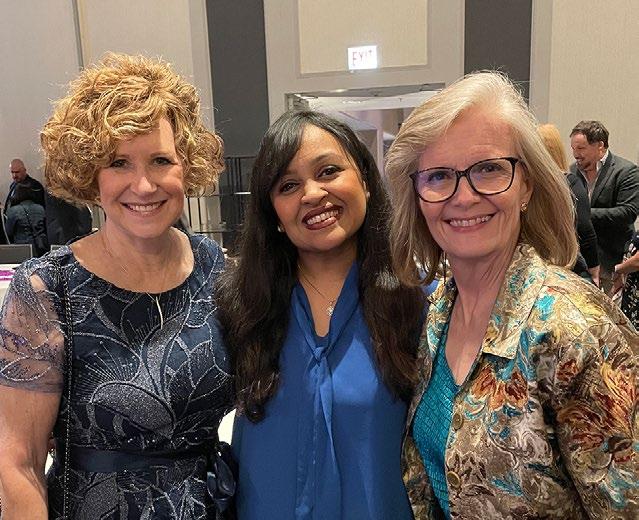
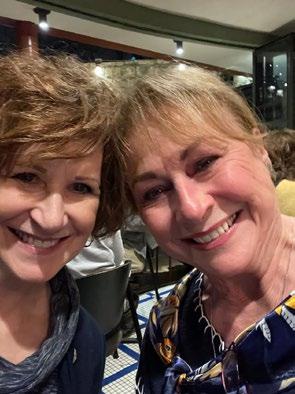
Diana Allan, soprano, has appeared in operatic and concert performances throughout the Midwest and Southwest United States, Germany, the Czech Republic, Italy, Mexico,
and Brazil. Allan has more than 30 years of university-level teaching experience and recently retired after 26 years on the voice faculty of the University of Texas at San Antonio. She is currently a member of the voice faculty of Missouri Southern State University. Allan is the author of “The Mindful Musician: Physical and Mental Strategies for Optimal Performance,” (2022) published by Shanghai Conservatory of Music Press, Ltd., and she is co-author of “The Relaxed Musician: Mental Preparation for Confident Performances” (2011). Allan has enjoyed more than three decades of membership in the National Association of Teachers of Singing, and she has served as Texoma region governor, Texoma auditions chair, NATS national vice president for auditions, NATS national president-elect, and, in July 2022, assumed the role of NATS national president.
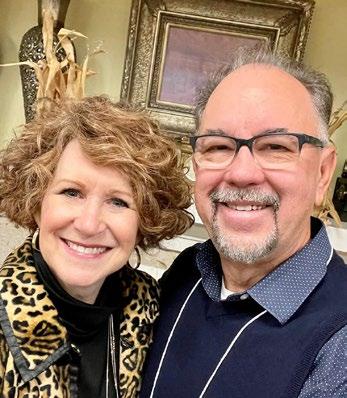
From National Nominating Committee
Carole Blankenship, Past President, Chair
Julie Krugman
Richard Weidlich
Albert Lee
Dana Lentini
Mark Kano
Yvonne Gonzales Redman
On behalf of the Board of Directors of the National Association of Teachers of Singing, Inc., we hereby issue an invitation to all NATS members, chapters, districts, and regions to submit suggestions for nominees for the national offices that will be open as of July 2024.
These offices may include those of President-Elect
Vice President for Membership
Vice President for Workshops
According to Article X Section 1 of our Bylaws
Vice President for Auditions
Vice President for Outreach
Secretary/Treasurer
The Association officers shall include a President, President-Elect, Past President, four Vice Presidents (outlined in Article X, Section 7) and a Secretary/Treasurer. Each Association officer shall be elected by vote of the membership as provided in these Bylaws. The person elected for the position of President-Elect shall serve one two-year term in that office, one two-year term as President, and one two-year term as Past President, and may not succeed themselves in any of these offices. Vice Presidents and the Secretary/Treasurer shall serve for two years and may succeed themselves once. Officers must be Full Members in Good Standing of the Association when elected and remain so throughout their terms of office. These officers form the Association’s Executive Committee.
By calling for the suggestions it is the hope of the Board of Directors that the National Nominating Committee will be able to consider several worthy candidates for the offices that will be open.
1. Complete the nominations form online via the NATS website at www.nats.org/officernominations no later than March 20, 2023.
2. A complete nomination includes the name and NATS organizational experience of the nominee, including information on why the nominee is suited for the position. Be sure to obtain the permission from the potential candidate to submit his or her name for the two-year term of office if selected to run, and if elected by the membership. The candidate for President-Elect must be willing to serve two-year terms as President-Elect, President, and Past President, for a total of six years.
The National Nominating Committee will select one candidate for each open office subject to approval at the 2023 NATS Board of Directors meeting. Prior to the election in Fall 2023, the slate of candidates will be published in Inter Nos and online at NATS.org.
NATS strives to be a welcoming and supportive community of members and students who celebrate the unique identities, varied backgrounds, and experiences of all individuals. We are dedicated to ensuring that all voices are valued and heard in an inclusive environment with equitable treatment for all.
Your participation in this nominating process is an essential part of electing national officers.
www.nats.org/officernominations
It’s not too late to see what the excitement was about! Packages are now available for purchase.
When you log in to the Live Learning Center, you'll experience a fabulous user-friendly platform. Our partners at Multiview have worked vigorously to update the site with new features including a faster load time, sleek look, and effortless navigation. Additionally, this website is entirely mobile friendly on all devices.

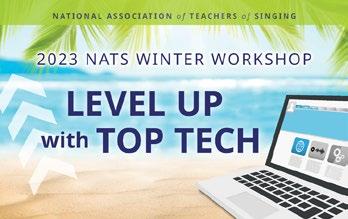
Full Conference Package - Unlimited Access
$129 Members | $149 Non-Members
Full Conference Package - 1 Year Access
$69 Members | $99 Non-Members
Single Session
$15 per session recording
All 2023 Winter Workshop registrants have received an email providing FREE access to all of the session videos until July 31, 2023.
Email multiviewmediasupport@multiview.com for assistance.
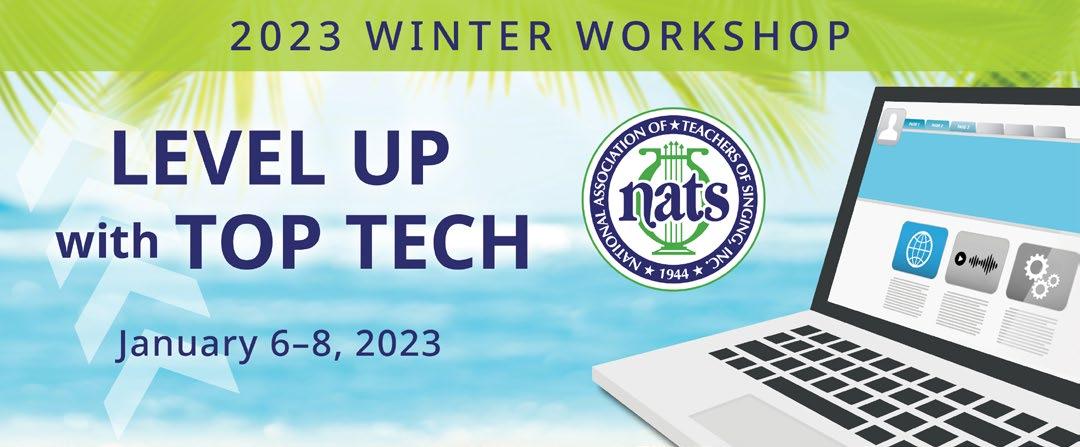 By DeMar Neal, VP of Workshops
By DeMar Neal, VP of Workshops
Since the summer of 2022 featured our biennial national conference, we’ve been eagerly anticipating the return of our next series of workshops. This began with the 2023 Winter Workshop, held at Florida International University in Miami, January 6-8. This year the theme was “Level Up with Top Tech,” where we explored myriad ways to integrate various forms of technology into our teaching, branding, and artistry.
Housed in the main concert hall of FIU’s Herbert and Nicole Wertheim School of Music & Performing Arts, we began the workshop with Michelle Markwart Deveaux laying the groundwork for technological success via organizational systems and standard operating procedures. Following this session, Laurel Irene and David Harris of VoiceScienceWorks demonstrated unique features of the Voce Vista software that allow for technical and artistic progress in studio teaching via their concept of “filtered listening.” During our sponsored lunch break we were treated to a fascinating product demonstration of the Appcompanist app by its creator Darin Adams. Returning in the afternoon, our next session was led by Jon Skidmore who explored the technological capacities of the human brain and psyche to manifest “peak performance.” The first day ended with social media marketer Karen Michaels, who presented a cavalcade of top apps to assist with digital marketing for personal and studio use.
The second day featured the first session by artist and media consultant Renee Namakau Ombaba, who demonstrated innovative and accessible uses of social media for teachers and
artists alike. The second session saw the return of Laurel Irene and David Harris, who went into further detail and applications of their filtered listening concepts utilizing Voce Vista. After lunch, Jon Skidmore led a session specifically focused on overcoming performance anxiety. The day ended with a conversational session led by Michelle Markwart Deveaux about how different technologies and systems function for her multi-revenue stream online businesses.
The third and final day started with Renee Namakau Ombaba’s second session on how to customize technologies to maximize personal branding strategies. This was followed by a final session from Laurel Irene and David Harris who emphasized the use of technologies for compassionate, human-centric instruction and learning. The workshop ended with Karen Michaels’ second session, which expounded on current trends for all aspects of digital marketing.
As always, I am humbled and honored to work with such a talented team of colleagues and volunteers. Special thanks is due to our most gracious and accommodating site host, Vindhya Khare, and her retinue of FIU students, staff, and faculty who all worked to make the event flow smoothly. Blake Stiles from EGAMI AVI deserves praise again for editing the videos, which are now available for viewing on the NATS Live Learning Center. And, of course, I remain indebted and grateful to the NATS staff for their tireless efforts behind the scenes. Thank you, Tina, Allen, Beth, and Karen, for everything!
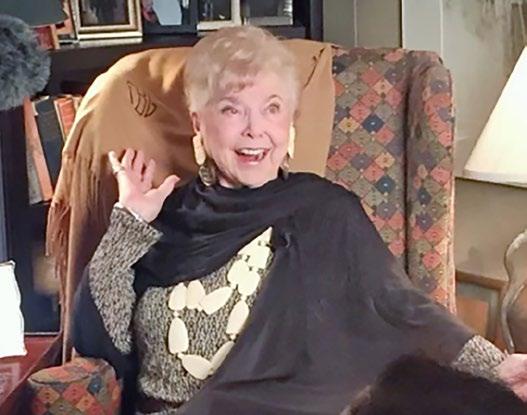
The National Association of Teachers of Singing (NATS) has received a $50,000 lead gift from Lisa Reagan Love to underwrite a new vision for the National Musical Theatre Competition (NMTC).
NATS plans to raise a $1 million endowment for NTMC to:
• Increase the influence the competition has on the musical theatre community by bringing forward phenomenal new talent from every corner of North America,
• Shift the competition from biennial to annual, and
• Elevate the prestige of NMTC to the most respected competition of its kind.
Love’s gift was given to honor Florence Birdwell, who will be honored at the gala finals of NMTC on January 8, 2024, at the Neidorff-Karpati Hall, Manhattan School of Music. Birdwell was a NATS member and a hugely influential voice professor at Oklahoma City University. Her students included Tony Award winners Kristin Chenoweth and Kelli O’Hara.
Love, herself, is a singer, composer, pianist, musician, and former Miss Oklahoma, who was a student of Birdwell’s at OCU.
NATS launched the first national competition for emerging musical theatre professionals in 2012. The association’s long history of hosting and adjudicating auditions and competitions meant the National Musical Theatre Competition (NMTC) immediately became one of the most prestigious competitions in the industry. This spring, former NMTC participants are starring in the title roles of Broadway productions: Aladdin (Michael Maliakel) and Bad Cinderella (Linedy Genao).
Now NATS envisions a powerful collaboration between New York professional theatre, the world’s largest network of voice teachers, and visionary investors in musical theatre. This partnership will further open the process for aspiring singing actors across North America who otherwise do not see a clear path to careers as professional actors. NMTC will introduce young, skilled, diverse, authentic singing actors to the community of musical theatre professionals.
The funding initiative will give NMTC a financial foundation to match its vision. The endowment will:
• Provide funding for competition expenses of finalists, semifinalists, and collaborative pianists.
• Increase engagement with the musical theatre industry.
• Transform the gala finals into a hot ticket musical theatre event.
Read more about the campaign on the NATS website. To make a gift or purchase tickets to the NMTC finals, go to our donor form
OVER $15,000 IN CASH AND OTHER PRIZES!
1ST PRIZE $10,000
Seeking out and promoting the best emerging talent in the field.
Online Auditions – October 15–30, 2023
In-Person Auditions (NYC) – TBD
Approximately 24 singers will advance to the semifinal round in New York City.
PLUS a concert at the 2024 NATS National Conference, and $1,000 gift certificate from Hal Leonard Corporation.
2ND PRIZE $2,500
PLUS a $500 Gift Certificate from Hal Leonard Corporation

3RD PRIZE $1,000 Louise Lerch Prize
" " " " " " " "
January 8, 2024 in New York City (as part of the NATS Winter Workshop)
All singers age 20 – 28 as of September 15, 2023
Reduced entry fee for students of NATS members. Adjudicators at all rounds will include casting agents and managers from the top agencies in the industry in addition to veteran performers, coaches, and teachers.
Foundation Heritage Fund of the NATS Endowment

Charitable giving to NATS saw substantial growth in 2022 with 674 donors contributing $263,543.29. Programs that benefitted from that support included the Intern Program, the Joan Frey Boytim Awards for Independent Teachers, and the Mentoring Program for Composers. In addition, endowments were established for two new awards, the Clifton Ware GroupVoice Pedagogy Award and the Barbara Hill Moore Award for Emerging Teaching Artists.
Giving for student scholarships also grew. Twenty chapters and regions benefited from the 2022 GivingTuesday Campaign which raised almost $30,000. Gifts supported scholarships for NSA participation and the new NATS High School Vocal Music Scholarships.
As a result of NATS fundraising during the year, the Texoma Region was able to award the first four scholarships for lessons going to students who otherwise would not be able to afford them. The lessons are taught by NATS members. Chapters that will soon award similar scholarships include the Wisconsin Chapter, the Puget Sound
Chapter, and the Las Vegas Chapter. The Las Vegas Chapter is creating the William McKoy Scholarship Fund to honor their past president who died in 2021.
As a benefit of fundraising done through a 2022 recital led by NATS past president Carole Blankenship, the Mid-South Chapter will present the first Sandra Franks Award for an Outstanding High School Singer at its region student auditions in March.
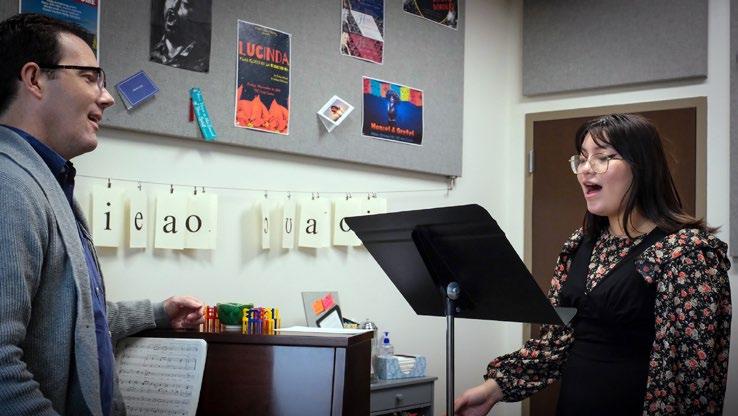
An important focus in 2022 was to expand member engagement in fundraising. Fundraising initiatives focused on chapter and region goals, and GivingTuesday was realigned to help chapter members support those local projects. Moving forward in 2023, centralized resources for creating small local fundraisers like recitals and karaoke nights will be expanded.
Planning for a campaign to create a $1 million endowment to grow the National Musical Theatre Competition was initiated in 2022. Lisa Reagan Love made a $50,000 lead gift to kick off the campaign. The finals of the National Musical Theatre Competition (NMTC), scheduled for January 8, 2024, at the Manhattan School of Music will feature a donor reception for sponsors and supporters of the campaign.
The Foundation Heritage Fund, which is the portion of the NATS Endowment raised by the former NATS Foundation, continued to grow through donations and contributed substantially to underwriting the National Conference and the Intern Program. It also funded the Van L. Lawrence Fellowship, the Emerging Leaders Award, and the Voice Pedagogy Award.
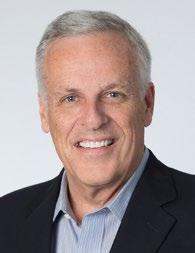
For many individuals, the bulk of our wealth is held in our estate – our retirement plan, property, life insurance, etc. This means that legacy giving might be the most impactful gift we will ever make.
How would you impact NATS? You could create a named scholarship for future NATS students or name a NATSAA or NMTC prize. You could advance the careers of young vocal teachers. You might provide permanent funding for the program you value most. Making a legacy gift to NATS advances our art in a lasting way.

A legacy gift to NATS makes you a member of the Encore! Society, created to recognize donors who have made a longterm commitment to NATS’ mission through estate gifts.
• Knowing your values will be carried forward by NATS
• Name recognition, with permission, in the NATS annual reports and on the NATS website
• The opportunity to name a scholarship or prize
• Invitations to NATS President’s Reception at the National Conference
• Updates on NATS programs and activities
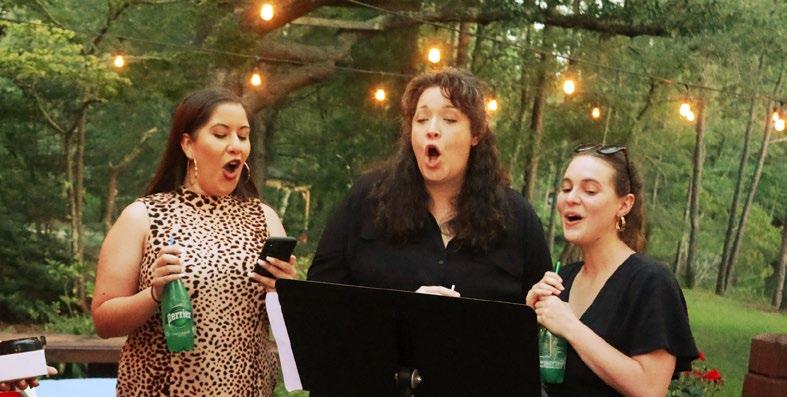
• Gifts In Your WILL OR TRUST
• A Gift of a LIFE INSURANCE POLICY
• Designate NATS as a beneficiary of BANK AND BROKERAGE ACCOUNTS
• LIFE INCOME PLANS
If you would like to discuss a charitable bequest, please call Bob Bryan at 904-992-9101 or email Bob@NATS.org.
You don’t have to be wealthy to leave a gift that will resound for generations.
NATS has been an important part of my life. I’m happy to know my gift will help transform lives for years to come.
— DIANA ALLAN, FOUNDING ENCORE! SOCIETY MEMBER
Thank you for transforming lives through the power of singing!
The year 2022 saw a 58% increase in the number of donors to NATS. Thank you!
Donors made significant contributions to NATS programs and services. Two new endowed NATS awards were established thanks to donor generosity – the Clifton Ware Group-Voice Pedagogy Award and the Barbara Hill Moore Award for Emerging Teaching Artists.
NATS also received a foundational gift to kick off the campaign for the National Musical Theatre Competition. Joan Frey Boytim funded another round of awards for the National Conference. And the Intern Program Grants established by the 2021 Master Teachers were fully funded again.
Local fundraising efforts were highlighted by the Texoma Region awarding the first-ever High School Vocal Music Fellowships to provide voice education for deserving singers who otherwise would not be able to afford it.
Thank you for supporting NATS philanthropy!
■ Investor – $2,500 and above
Diana Allan – IMPACT Award (In Honor of Allen Henderson), Texoma Region Vocal Music Fellowships, Richard D. Sjoerdsma Prize, New England Region Auditions Fund, Wisconsin Chapter Vocal Music Fellowships, Southeastern Region Vocal Music Fellowships
Joan Frey Boytim – Joan Frey Boytim Awards for Independent Teachers, IMPACT Award (In Honor of Allen Henderson)
Karen Brunssen – IMPACT Award (In Honor of Allen Henderson), Puget Sound Chapter Vocal Music Fellowships, New England Region Auditions Fund, Texoma Region Vocal Music Fellowships, Unrestricted Gift (In Honor of Diana Allan), Chicago Chapter Scholarship Fund, Intern Program Grants Established by the 2021 Master Teachers (In Honor of Donald Simonson), Richard D. Sjoerdsma Prize
Kathy Chapman – Wisconsin Chapter Vocal Music Fellowships
Kathryn Proctor Duax – NATS Intern Program
Allen Henderson – Georgia Chapter Scholarship Fund, IMPACT Award, Intern Program Grants Established by the 2021 Master Teachers
Barbara Hill Moore – Barbara Hill Moore Award for Emerging Teaching Artists, IMPACT Award (In Honor of Allen Henderson), Texoma Region Vocal Music Fellowships
Myra Hoane – Winnifred Collier Ringhoffer Memorial Fund (In Memory of Our Mom, Winn Ringhoffer, with love from her three daughters)
Inland Empire Chapter – Winnifred Collier Ringhoffer Memorial Fund
Julie Krugman – New England Region Auditions Fund, IMPACT Award (In Honor of Allen Henderson), National Musical Theatre Competition Fund
Lori Laitman – Art Song Composition Award, Mentoring Program for Composers
Lisa Reagan Love – National Musical Theatre Competition Fund (In Honor of Florence Birdwell)
Richard Sjoerdsma – Barbara Doscher Endowment, Richard D. Sjoerdsma Prize, Deborah L. Guess, IMPACT Award (In Honor of Allen Henderson)
Karen Slade – William McCoy Scholarship Fund
Clifton Ware – Group Voice Pedagogy Award
■ Patron – $1,500–$2,499
Carole Blankenship – Sandra Franks Award, IMPACT Award (In Honor of Allen Henderson)
William Carroll – Barbara Hill Moore Award for Emerging Teaching Artists
Gabriel Gargari – Puget Sound Chapter Vocal Music Fellowships
Robert King – Barbara Hill Moore Award for Emerging Teaching Artists
Jeanai La Vita – Barbara Hill Moore Award for Emerging Teaching Artists (In Honor of Queen Barbara Hill Moore)
Mid-Atlantic Region – IMPACT Award (In Honor of Allen Henderson), NSA Scholarship Endowment, Maryland DC Chapter Mission Fund, North Carolina Chapter Scholarship Fund, South Carolina Chapter Scholarship Fund, Susan Randolph Braden Memorial Endowment
■ Leader – $1,000–$1,499
Casey Carter – Texoma Region Vocal Music Fellowships (In Honor of Barbara Hill Moore, Bronwen Forbay, Randy Umstead, Nancy Elledge, Robert Hansen) (In Honor of Melinda, Dan, Debi, Greg, and San-Ky for their dedication and leadership) (In Honor of Mila Beth Gibson and her incredible contributions to opera and beautiful singing here in Texas)
Michelle Markwart Deveaux – Intern Program Grants
Established by the 2021 Master Teachers
Nita Herrick-Colpitts – National Student Auditions Awards
Daniel Johnson-Wilmot – IMPACT Award (In Honor of Allen Henderson), American Negro Spiritual Competition, Wisconsin Chapter Vocal Music Fellowships
Emily Slade Meyer – William McCoy Scholarship Fund
Leah Moore – Barbara Hill Moore Award for Emerging Teaching Artists
Lisa Popeil – Intern Program Grants Established by the 2021 Master Teachers (In Memory Of Gisela Goettling)
Frank Ragsdale – Intern Program Grants Established by the 2021 Master Teachers, IMPACT Award (In Honor of Allen Henderson)
Marilyn Spillers – William McCoy Scholarship Fund
Craig Terry – Intern Program Grants Established by the 2021 Master Teachers
Robert Wells – IMPACT Award (In Honor of Allen Henderson), NSA Scholarship Endowment
Texaoma Region – Texoma Vocal Music Fellowships
■ Advocate – $500–$999
Deborah Baxter – Intern Program Grants Established by the 2021 Master Teachers
Alisa Belflower – IMPACT Award (In Honor of Allen Henderson), Shirlee Emmons/Berton Coffin Award (In Honor of Charles Smith & Donna Harler-Smith)
Janice Betts – Vocal Lab NYC Scholarship Fund
Kenneth Bozeman – Richard D. Sjoerdsma Prize, Intern Program Grants Established by the 2021 Master Teachers
Bob Bryan – IMPACT Award (In Honor of Allen Henderson), Texoma Region Vocal Music Fellowships, Wisconsin Chapter Vocal Music Fellowships
Torin Chiles – IMPACT Award (In Honor of Allen Henderson), Barbara Hill Moore Award for Emerging Teaching Artists
Kim Clarke – Puget Sound Chapter Vocal Music Fellowships
Connecticut Chapter – New England Region Auditions Fund
Leslie Curda – IMPACT Award (In Honor of Allen Henderson)
Howard Hanger – Barbara Hill Moore Award for Emerging Teaching Artists
Brenda Henderson – IMPACT Award (In Honor of Allen Henderson)
Sarah Holman – IMPACT Award (In Honor of Allen Henderson), William Vennard Award Fund, Chicago Chapter Scholarship Fund
Daniel Hunter-Holly – Barbara Hill Moore Award for Emerging Teaching Artists, NATS Intern Program
Seiko Igarashi – Sandra Franks Award
Julie Jones – IMPACT Award (In Honor of Allen Henderson), Winnifred Collier Ringhoffer Memorial Fund
Jerry Jordan – Sandra Franks Award
Claudia Kitka – IMPACT Award (In Honor of Allen Henderson)
Mario Martinez – Intern Program Grants Established by the 2021 Master Teachers, IMPACT Award (In Memory of Professor William McIver)
Geena Mattox – Barbara Doscher Endowment
Carol Ann Modesitt – William McCoy Scholarship Fund
Judith Nicosia – Richard D. Sjoerdsma Prize
John Nix – Barbara Doscher Endowment, Richard D. Sjoerdsma Prize, Texoma Region Vocal Music Fellowships, IMPACT Award (In Honor of Allen Henderson)
North Central Region – Wisconsin Chapter Vocal Music Fellowships
Gale Odom
Oklahoma Chapter
Tracy Peterson
Raymond Salazar
Timothy Schmidt
Southeastern Region – IMPACT Award (In Honor of Allen Henderson)
Darryl Taylor – IMPACT Award (In Honor of Allen Henderson), Intern Program Grants Established by the 2021 Master Teachers
The Petrie/White Higher Education and Performing Arts Fund – Foundation Heritage Fund
Craig Tompkins – National Musical Theatre Competition Awards, IMPACT Award (In Honor of Allen Henderson)
Randall Umstead – IMPACT Award (In Honor of Allen Henderson), Texoma Region Vocal Music Fellowships
Heidi Wylie – IMPACT Award (In Honor of Allen Henderson), Wisconsin Chapter Vocal Music Fellowships
Anonymous (3)
■ Partner – $250–$499
Robert Bastian
Neal & Joey Beckford – Sandra Franks Award
Beverly Blouin – Southeastern Region Vocal Music Fellowships
Mary Anne Braund
Rebecca Coberly – Texoma Region Vocal Music Fellowships
C. Earl Coleman Jr. – Intern Program Grants Established by the 2021 Master Teachers
Christin Cornell – IMPACT Award (In Honor of Allen Henderson), Unrestricted Gift (In Honor of Dr. Maurice Allard)
Debra Darnell – Barbara Doscher Endowment
Alexis Davis-Hazell – IMPACT Award (In Honor of Allen Henderson), Southeastern Region Vocal Music Fellowships, Alabama Chapter, Barbara Hill Moore Award for Emerging Teaching Artists
Julie Earl – Barbara Hill Moore Award for Emerging Teaching Artists
Alison Feldt – IMPACT Award (In Honor of Allen Henderson)
Tod Fitzpatrick – Deborah L. Guess
Kristen Gunn – NATS Intern Program (In Memory of Jerrold Pope and Roy E. Delp)
John Hacker – IMPACT Award (In Honor of Allen Henderson), Chicago Chapter Scholarship Fund
Theresa Brancaccio Hansen – IMPACT Award (In Honor of Allen Henderson), NATS Intern Program, Intern Program Grants Established by the 2021 Master Teachers (In Honor of Karen Brunssen)
Leslie Holmes – Richard D. Sjoerdsma Prize, Barbara Hill Moore Award for Emerging Teaching Artists (In Memory of Kathleen Arecchi), Unrestricted Gift (In Memory of Jean Westerman Gregg)
Antonina Johnston – IMPACT Award (In Honor Of WI NATS Chapter)
Mark Kano – IMPACT Award (In Honor of Allen Henderson), Sandra Franks Award
Kendra Krugman – New England Region Auditions Fund
Brian Kung – Puget Sound Chapter Vocal Music Fellowships
Cynthia Lawrence-Calkins – IMPACT Award (In Honor of Allen Henderson), Kentucky Chapter Scholarship Fund, Barbara Doscher Endowment
Junshi Lu – William McCoy Scholarship Fund
Lorna Macdonald – Unrestricted Gift (In Memory of Dalton Baldwin), Intern Program Grants Established by the 2021 Master Teachers
Scott McCoy – IMPACT Award (In Memory of Shirlee Emmons), Intern Program Grants Established by the 2021 Master Teachers
Jan McDaniel – Texoma Region Vocal Music Fellowships (In Memory of Tevyn Hill), IMPACT Award (In Honor of Allen Henderson)
Patrice Michaels – IMPACT Award (In Honor of Allen Henderson), Intern Program Grants Established by the 2021 Master Teachers (In Memory of Jack Coldiron)
Helen Norman – Sandra Franks Award (In Memory of Sandy Franks)
Jeffrey Picon – Texoma Region Vocal Music Fellowships
Kari Ragan – Puget Sound Chapter Vocal Music Fellowships, IMPACT Award (In Honor of Allen Henderson), Intern Program Grants Established by the 2021 Master Teachers
Rebecca Salter – Southeastern Region Vocal Music Fellowships, Georgia Chapter Scholarship Fund, Alabama Chapter
Noel Smith – IMPACT Award (In Honor of Allen Henderson), New England Region Mission Fund
W. Stephen Smith – Intern Program Grants Established by the 2021 Master Teachers
Linda Snyder – IMPACT Award (In Honor of Allen Henderson), National Musical Theatre Competition Fund
Melanie Sonnenberg – IMPACT Award (In Honor of Allen Henderson)
Norman Spivey – Deborah L. Guess
Steve Sudik – NATS Vocal Arts Scholarships
Cynthia Vaughn – IMPACT Award (In Honor of Allen Henderson), Texoma Region Vocal Music Fellowships, Inland Northwest Chapter Scholarship Fund, NATS Intern Program
Michael Walsh – Barbara Hill Moore Award for Emerging Teaching Artists, Texoma Region Vocal Music Fellowships
West Central Region – NSA Scholarship Endowment (In Memory of Dale Ganz)
Eve-Anne Wilkes – IMPACT Award (In Honor of Allen Henderson), Redwood Empire Chapter Scholarship Fund
Anonymous – NSA Scholarship Endowment
Anonymous – Texoma Region Vocal Music Fellowships (In honor of the incredible work and leadership of Daniel Hunter-Holly, Michael Walsh and Melinda Brou for the Texoma Region)
Anonymous
Anonymous – Vocal Lab NYC Scholarship Fund
■ Friend – $100–$249
Alison Acord – IMPACT Award (In Honor of Allen Henderson)
Darin Adams – Texoma Region Vocal Music Fellowships
J. Robert Adams
Martha Albornoz – Vocal Lab NYC Scholarship Fund
Nanne Allecia – National Musical Theatre Competition Fund
Mary and Jack Anderson – New England Region Auditions Fund
Chadley Ballantyne – IMPACT Award (In Honor of Allen Henderson), NATS Intern Program
Ginger Beazley – NSA Scholarship Endowment
Martha Becker – Sandra Franks Award
Roberta Belanger – New England Region Auditions Fund
Holly Boaz
Joanne and Ken Bozeman – IMPACT Award (In Honor of Allen Henderson), Wisconsin Chapter Vocal Music Fellowships
Faye Brenner
Kimberly Brien – Sandra Franks Award
Kimberly Broadwater – IMPACT Award (In Honor of Allen Henderson)
Frances Brockington – Unrestricted Gift (In Honor of Celeste Cole)
Melinda Brou – Texoma Region Vocal Music Fellowships, IMPACT Award (In Honor of Allen Henderson)
Rebecca Brou – Texoma Region Vocal Music Fellowships
Angelique Brou – Texoma Region Vocal Music Fellowships (In Honor of my beautiful cousin, Melinda Brou! So proud)
Jason Brou – Texoma Region Vocal Music Fellowships
Paige Brown – Texoma Region Vocal Music Fellowships
Thomas Bumgardner – IMPACT Award (In Honor of Allen Henderson), NATS Intern Program
Mark Calkins – Barbara Doscher Endowment
Patricia Callaway – IMPACT Award (In Honor of Allen Henderson)
Jeffrey Carter – IMPACT Award (In Honor of Allen Henderson), Texoma Region Vocal Music Fellowships, National Musical Theatre Competition Fund
Laura Carter – Deborah L. Guess
Tim Cerino – Vocal Lab NYC Scholarship Fund
Robert Chafin – IMPACT Award (In Honor of Allen Henderson), Unrestricted Gift (In Honor of Sylvia Tibby Plyler)
Carol Chapman – NSA Scholarship Endowment, Unrestricted Gift (In Memory of Pat and Les Cherry)
Katherine Ciesinski – IMPACT Award (In Honor of Allen Henderson)
Carol Clary – Unrestricted Gift (In Honor of Esther Andreas)
Amanda Cline – William McCoy Scholarship Fund
Anne-Marie Condacse – Texoma Region Vocal Music Fellowships
Karen Cooper – Sandra Franks Award (In Memory of my best friend)
Raquel Cortina – Unrestricted Gift (In Memory of Ruth Falcon)
Ainhoa Costas – Texoma Region Vocal Music Fellowships
Linda Cowan – IMPACT Award (In Honor of Allen Henderson), Unrestricted Gift (In Honor of Judith Nicosia)
Cyndi Cummings – Texoma Region Vocal Music Fellowships
Margaret Cusack – NATS Intern Program
Judith Dailey – Puget Sound Chapter Vocal Music Fellowships
Sharon Daniels – Unrestricted Gift (In Memory of life long active member of NATS, baritone Dan Sullivan)
Alan Darling – IMPACT Award (In Honor of Allen Henderson)
Cathy Delorenz – Texoma Region Vocal Music Fellowships
Barbara Jean Fox DeMaio – Texoma Region Vocal Music Fellowships, National Musical Theatre Competition Fund (In Honor of Florence Birdwell)
Susan Dennis - Patton – Chicago Chapter Scholarship Fund
Meghan DeWald – NATS Intern Program
Linda Di Fiore – Unrestricted Gift (In Memory of Dorothy Barnhouse), Barbara Hill Moore Award for Emerging Teaching Artists
Meghan Dibble – NSA Scholarship Endowment (In Honor of Chloe Owens)
Paul Doucet – Barbara Hill Moore Award for Emerging Teaching Artists
Jan Eric Douglas
Martha Drexler – Sandra Franks Award (In Memory of Dr. Sandra Franks)
Janice Edwards – New England Region Auditions Fund
Joseph Edwards – Sandra Franks Award
Robert Edwin – Richard D. Sjoerdsma Prize
Kate Egan – NSA Scholarship Endowment
Nancy Elledge – Texoma Region Vocal Music Fellowships
Cynthia Everitt – Texoma Region Vocal Music Fellowships
Mark Fithian – Puget Sound Chapter Vocal Music Fellowships
Flash Birds Foundation – Texoma Region Vocal Music Fellowships
April Fotis – Vocal Lab NYC Scholarship Fund
Diane Foust – Barbara Hill Moore Award for Emerging Teaching Artists (In Honor of Barbara Hill Moore, my voice teacher at SMU)
Joseph Frank – Unrestricted Gift (In Honor of Erie Mills and Thomas Rescigno)
Megan Franke – William McCoy Scholarship Fund
Caitlin Gaffney – Vocal Lab NYC Scholarship Fund
Andrew Garland – NATS Intern Program
Victoria Garrett – Karl Trump Award Fund
Nedra Gaskill
Carole Gaspar – Foundation Heritage Fund
Laurena Mitzi Gatlin – New England Region Auditions Fund
Karen Gay – Texoma Region Vocal Music Fellowships
Beatrice Bergér Gee – NSA Scholarship Endowment
Christine Gilbert – Puget Sound Chapter Vocal Music Fellowships
Brian Patrick Gill – Barbara Doscher Endowment
Marina Gilman – IMPACT Award (In Honor of Allen Henderson)
Kerry Ginger – IMPACT Award (In Honor of Allen Henderson)
Carrie ‘CJ’ Greer – IMPACT Award (In Honor of Allen Henderson)
Harolyn Greer – Barbara Hill Moore Award for Emerging Teaching Artists (In Memory of Arthur Woodley)
Debra Greschner – Richard D. Sjoerdsma Prize
Karen Hall – IMPACT Award (In Memory of Sandra Hall)
Lynn Helding – Richard D. Sjoerdsma Prize
Kathleen Henkel
Jerry Heston – Sandra Franks Award
Roy Hoobler – Alabama Chapter BIPOC Competition
Danielle Howard – New England Region Auditions Fund
Eric Howe
Ian Howell – NATS Intern Program
Thomas Hueber – IMPACT Award (In Honor of Allen Henderson)
Jerry Huff – Sandra Franks Award (In Memory of Dr. Sandra Franks)
Kimberly Gratland James – IMPACT Award (In Honor of Allen Henderson), William McCoy Scholarship Fund
Annette James – Sandra Franks Award
Nancy Jantsch
Amy Jarman – Sandra Franks Award, IMPACT Award (In Honor of Allen Henderson)
Andrea Jarmon – Georgia Chapter Scholarship Fund
Rebecca Johnson – NSA Scholarship Endowment (In Honor Of Pamela Hegg)
William Joyner – Texoma Region Vocal Music Fellowships
Lana King – Texoma Region Vocal Music Fellowships
Robert King – Texoma Region Vocal Music Fellowships (In Honor of Arthur Shearin, my mentor)
Thomas Roy King – Unrestricted Gift (In Honor of David Holloway)
Crystal Kirkman – William McCoy Scholarship Fund
Nicholas Klein – Puget Sound Chapter Vocal Music Fellowships
Eileen Lawrence – Texoma Region Vocal Music Fellowships
Megan Leinweber – William McCoy Scholarship Fund
Mary Leising – Wisconsin Chapter Vocal Music Fellowships
Dana Lentini – IMPACT Award (In Honor of Allen Henderson)
Jill Terhaar Lewis – IMPACT Award (In Honor of Allen Henderson)
Cynthia Linton – Sandra Franks Award
Donna Loewy – IMPACT Award (In Honor of Allen Henderson)
Cynthia Longoria – Texoma Region Vocal Music Fellowships (In Memory of Linda Mulder, Fay Hernandez, Joseph Brown, Rene Pena and Uncle Chago)
Carol Loverde – IMPACT Award (In Honor of Allen Henderson)
Jeannette LoVetri – Intern Program Grants Established by the 2021 Master Teachers
Jordan Madagame – William McCoy Scholarship Fund
Julie Makerov
Sharyn June Mapes – IMPACT Award (In Honor of Marvin Keenze), National Musical Theatre Competition Fund (In Honor of Marvin Keenze)
Alyssa Maree – Texoma Region Vocal Music Fellowships
Richard Margison
Jennifer Susan Mather – National Musical Theatre Competition Fund
Susan Matsuki – Unrestricted Gift (In Honor of David Sabella)
Lynn Maxfield – Richard D. Sjoerdsma Prize
Lori McCann – NSA Scholarship Endowment
Matthew McDaniel – Texoma Region Vocal Music Fellowships
Nancy McDuffie – Unrestricted Gift (In Honor Of Oscar McCullough)
Erie Mills – Karl Trump Award Fund
Lloyd Mims – IMPACT Award (In Honor of Allen Henderson)
Craig Moody – Vocal Lab NYC Scholarship Fund
Caroline Morath – Sandra Franks Award
Wendy Morgan-Hunter – National Musical Theatre Competition Awards (In Honor Of Alberta Birdie Gysin)
Kyla Moulton – New England Region Mission Fund
Wendy Anne Mullen – IMPACT Award (In Honor of Allen Henderson)
Gara Nail – Vocal Lab NYC Scholarship Fund
Tim and Bethany Nail – Vocal Lab NYC Scholarship Fund
Ayumi Nakamae
Network for Good – Foundation Heritage Fund
Leone Nielson – Puget Sound Chapter Vocal Music Fellowships
Jan Opalach – Barbara Doscher Endowment (In Honor of Dorothy Opalach), IMPACT Award (In Memory of Dorothy and Stanley Opalach), NATS Intern Program (In Honor Of my parents)
Jordyn Day Palmer – Puget Sound Chapter Vocal Music Fellowships
Audrey Penrose – Texoma Region Vocal Music Fellowships
Patti Peterson – Barbara Doscher Endowment
Carrie Pichan – Vocal Lab NYC Scholarship Fund
Marci Pierson – Texoma Region Vocal Music Fellowships
Jonathan Pilkington – Georgia Chapter Scholarship Fund
Barbara Jo Poier – Sandra Franks Award
Greta Pope – Chicago Chapter Scholarship Fund
Jessica Posada – Texoma Region Vocal Music Fellowships
Roma Prindle – Group Voice Pedagogy Award, NSA Scholarship Endowment
Jan Prokop – National Musical Theatre Competition Fund (In Honor of Marni Nixon)
Kimberly Randall – IMPACT Award (In Honor of Allen Henderson)
Martha Randall – Todd Duncan Award Fund (In Memory of Todd Duncan)
Yvonne Gonzales Redman – Barbara Doscher Endowment
S. Patton Rice – Roy Delp Fund
Bruce Wittrig and Mary Alice Rich – Barbara Hill Moore Award for Emerging Teaching Artists
Jennifer Richards – Wisconsin Chapter Vocal Music Fellowships
Twyla Robinson
Trineice Robinson-Martin – Richard D. Sjoerdsma Prize
Kathleen Roland-Silverstein – Richard D. Sjoerdsma Prize
Julia Rottmayer – Wisconsin Chapter Vocal Music Fellowships
Lisa Roy – New England Region Auditions Fund
Peter John Santogade – NSA Scholarship Endowment
Robert Sataloff – Richard D. Sjoerdsma Prize
Deborah Saverance
Joseph Saylor – Puget Sound Chapter Vocal Music Fellowships
Brooke Ashley Schrager – Chicago Chapter Scholarship Fund
Melissa Sela – Texoma Region Vocal Music Fellowships
Winnie Loraine Sims
Brenda Smith – Unrestricted Gift (In Honor Of Joan Frey Boytim)
Paula Smith – Texoma Region Vocal Music Fellowships
Tracey Smith – Sandra Franks Award
Marie Smyth – Texoma Region Vocal Music Fellowships
Jeffrey Snider – Texoma Region Vocal Music Fellowships (In Memory of Dr. Robert Baird), Edward Baird-Bruce Lunkley Award Fund (In Memory of Dr. Edward Baird)
Dean Southern – NATS Intern Program
Patricia Stiles – Indiana Chapter Scholarship Fund
Margaret Sweeney – New England Region Auditions Fund
Anne & Wayne Tansil – Sandra Franks Award
Sally Thomas
Nina Tober – NSA Scholarship Endowment
Thomas Tweel – Sandra Franks Award
Dana Vachharajani – Unrestricted Gift (In Honor of Irene Gubrud)
Shelby Vannordstrand – Unrestricted Gift (In Honor Of Alisa Belflower), Nebraska Chapter Scholarship Fund
Michael Vavases – Southeastern Region Vocal Music Fellowships
Dhruva Vishnu – Texoma Region Vocal Music Fellowships
Yuanyuan Maisui Wang
Alison Watson-Moodie – Ontario Chapter Scholarship Fund
Patricia Weis – NSA Scholarship Endowment (In Honor Of Adele Borouchoff)
Deirdre Welborn – South Carolina Chapter Scholarship Fund
Norma Wesson – Sandra Franks Award (In Memory of Dr. Sandra Franks)
Evelyn White – Vocal Lab NYC Scholarship Fund
Jay White – NATS Intern Program (In Memory of Martha Randall)
Andrew Whitfield – NATS Intern Program
Julie Anne Wieck – Winnifred Collier Ringhoffer Memorial Fund
Sarah Wigley – Central Illinois Chapter Scholarship Fund
Amy Wilson – Sandra Franks Award
Mary Wilson – Sandra Franks Award
Amelia Wood – Puget Sound Chapter Vocal Music Fellowships
Shara Wood – Wisconsin Chapter Vocal Music Fellowships
David Wright – Vocal Lab NYC Scholarship Fund
Sarah Wylie – Wisconsin Chapter Vocal Music Fellowships
Anonymous – NSA Scholarship Endowment (In Honor of Marvin Keenze)
Anonymous (8)
View full list on NATS.org
September 2022– February 1, 2023
Carolyn Dorff
Lia Kahler
Carol Fisher Mathieson
Ina C. Pegram
Isabel Samfield
Carol Webber
Eva Wright
Hazel Zehner
WHEN YOU JOIN THE NATIONAL ASSOCIATION OF TEACHERS OF SINGING, you become part of the largest organization of voice professionals in the world with 7,000+ members in more than 35 countries. Whether working in independent studios, community schools, elementary and secondary schools, or higher education, NATS members represent the diversity of today’s music landscape — teaching and coaching in all vocal styles.
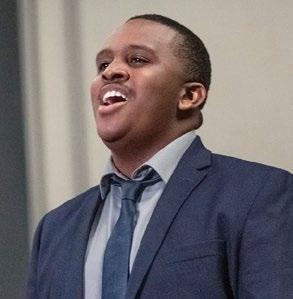
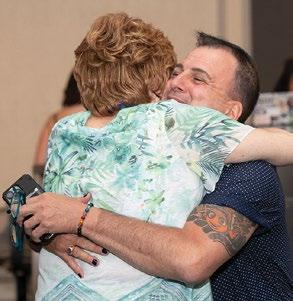
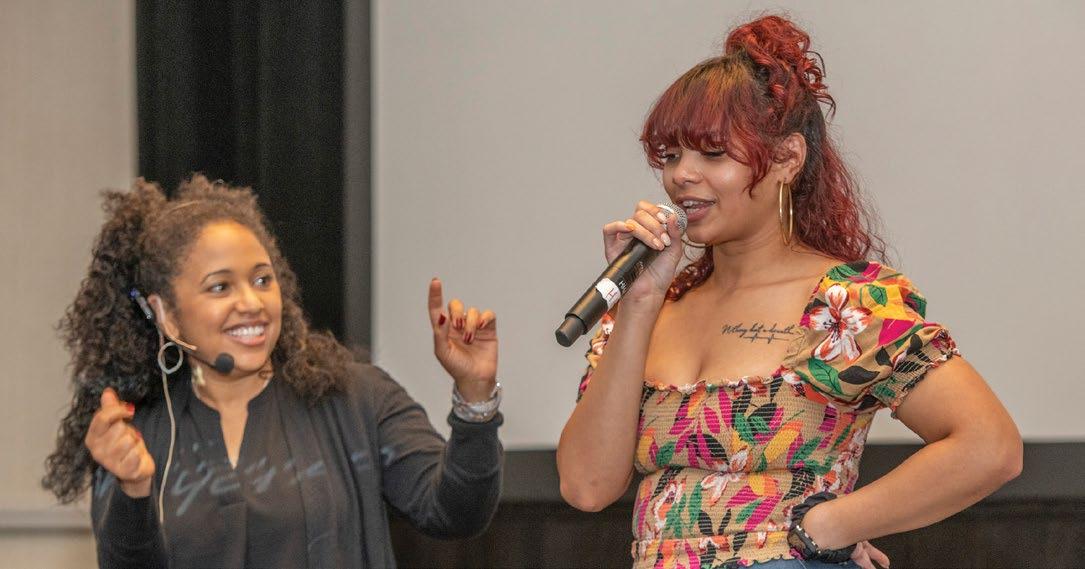
• Professional development & networking
• Timely webinars & trusted resources
• Journal of Singing subscription

• National competitions & student auditions (Expanded genres & categories for 2023!)
• Virtual & live events to meet your needs
• Access to the NATS Members-Only Facebook Group with feedback on the latest information & technology
• Access to members-only benefits such as discounts on teaching tools, health insurance, & small business tools
• Discounted member prices for NATS workshops & conferences
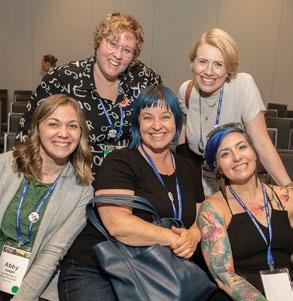
Student memberships start at just $46 per year!
JOIN TODAY at NATS.ORG
